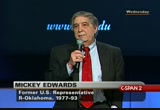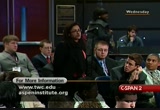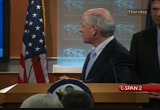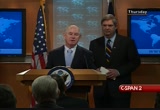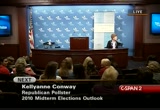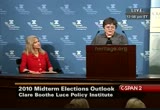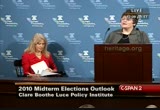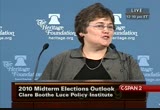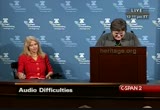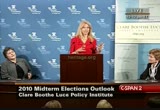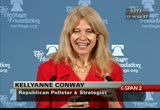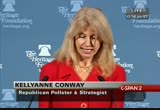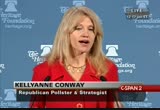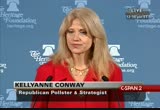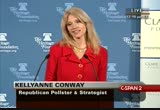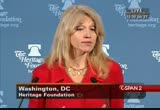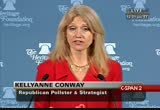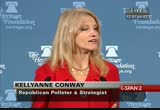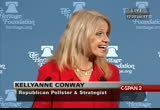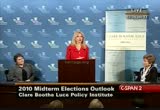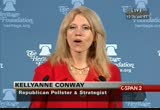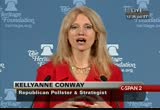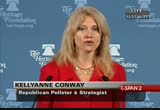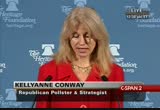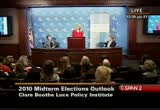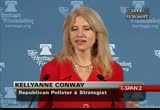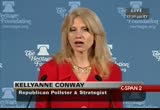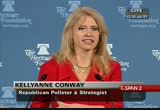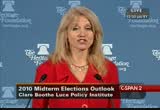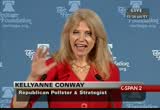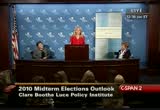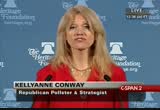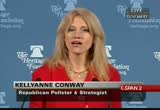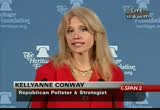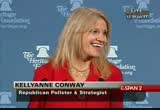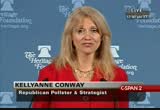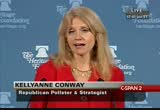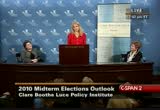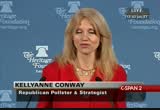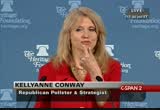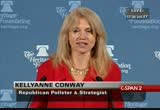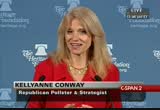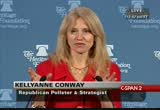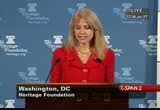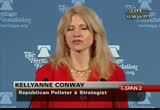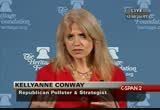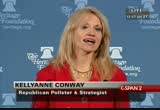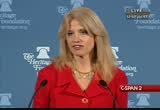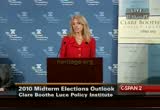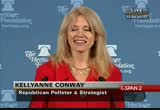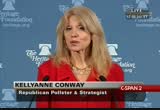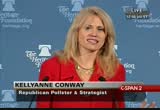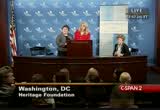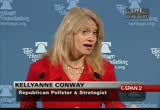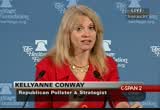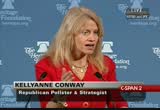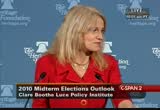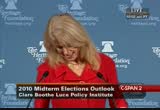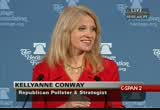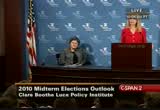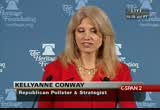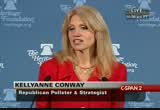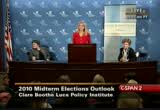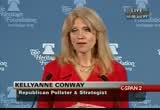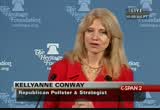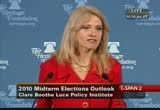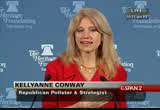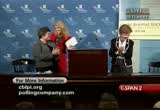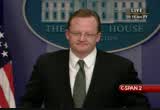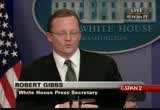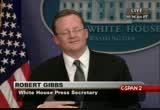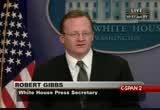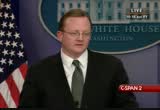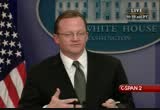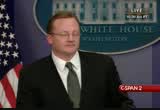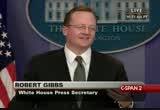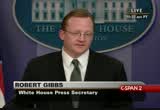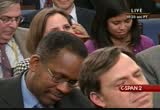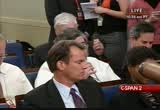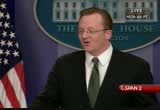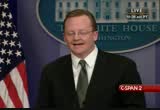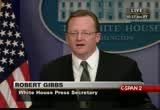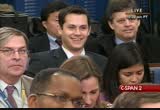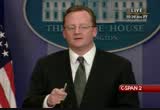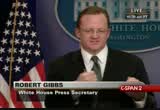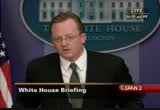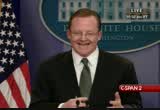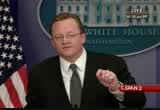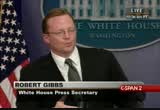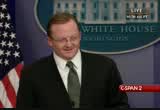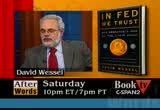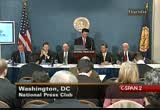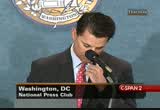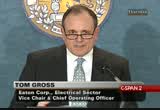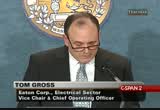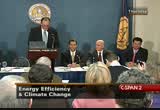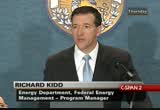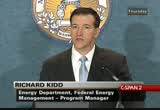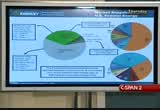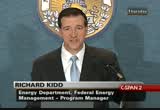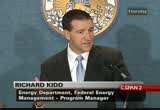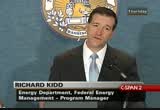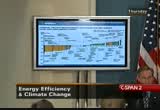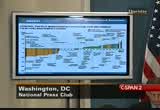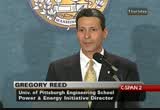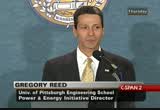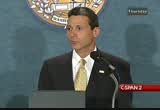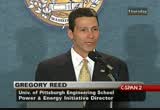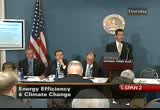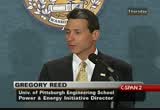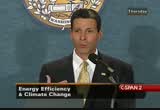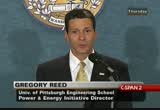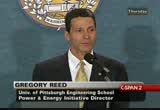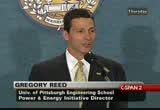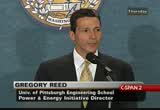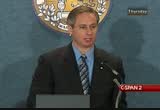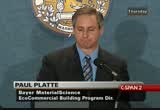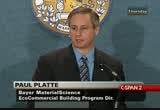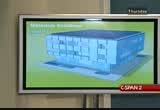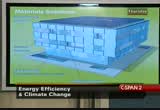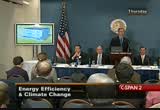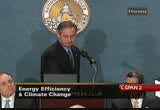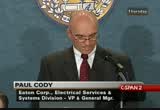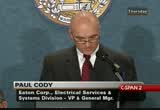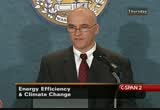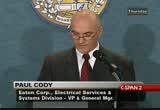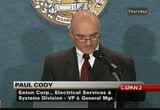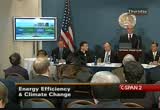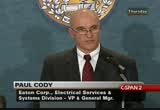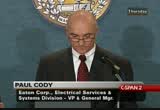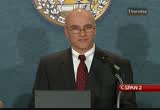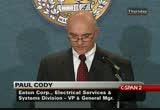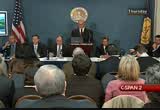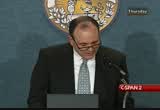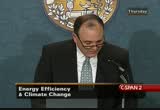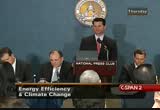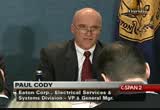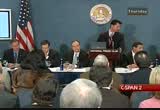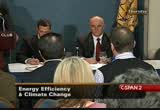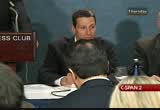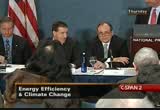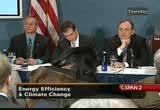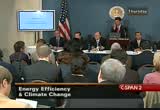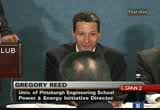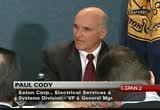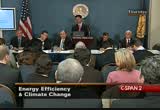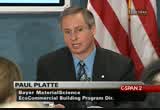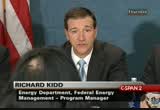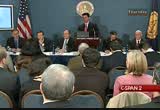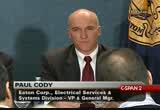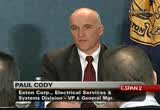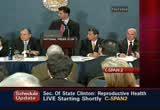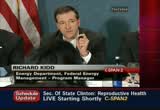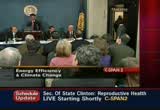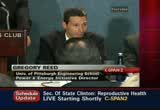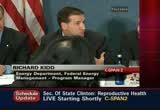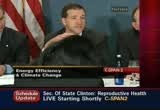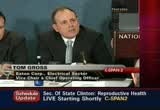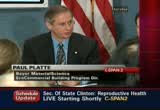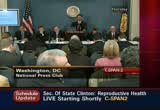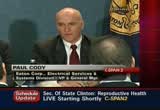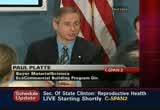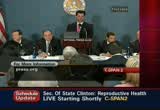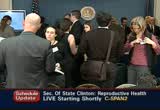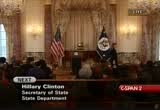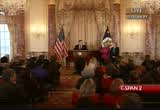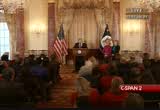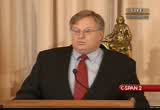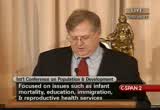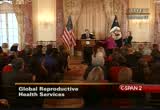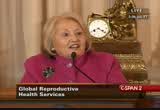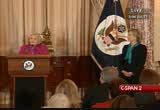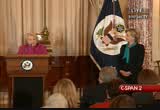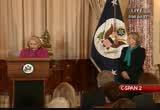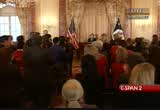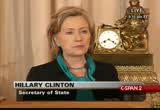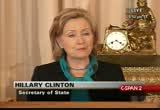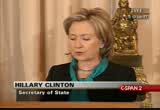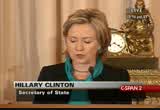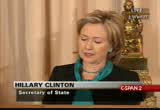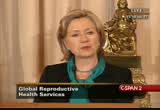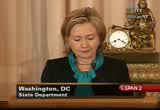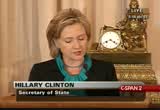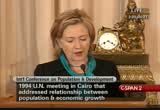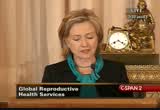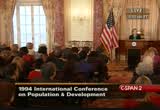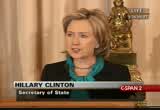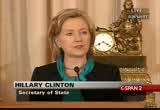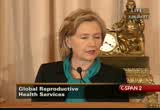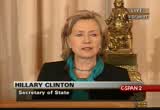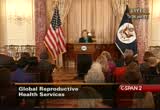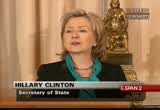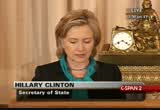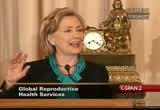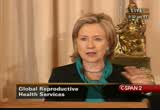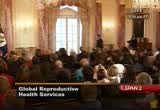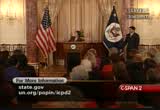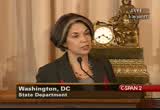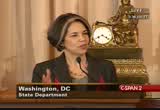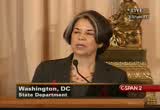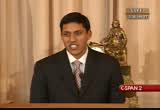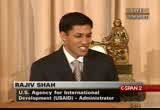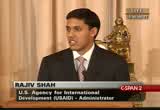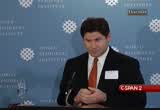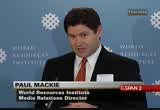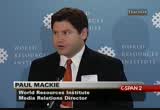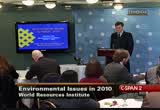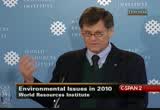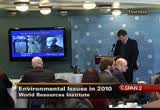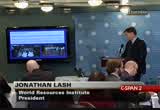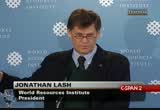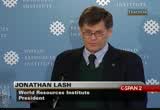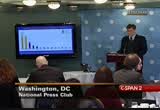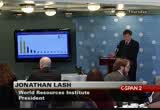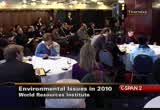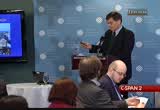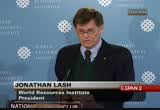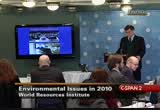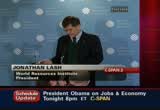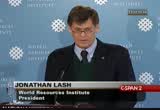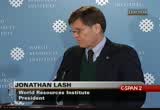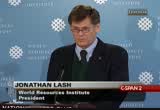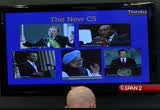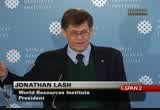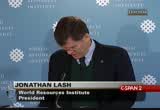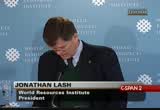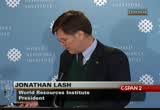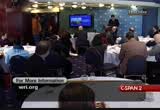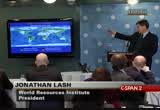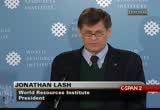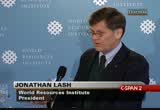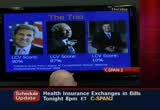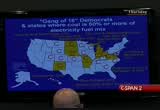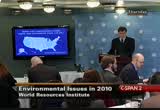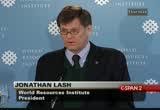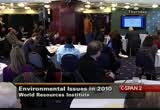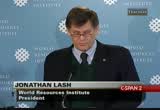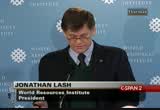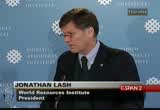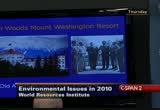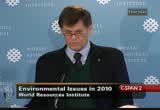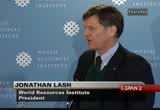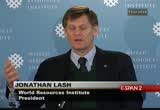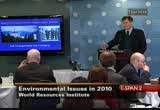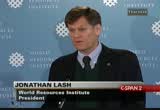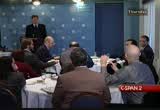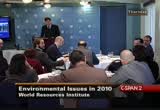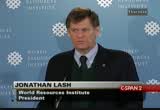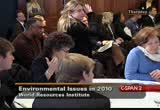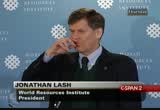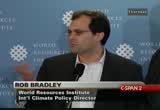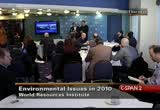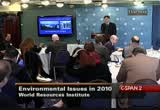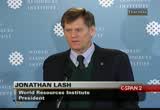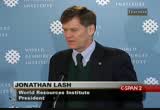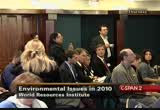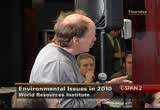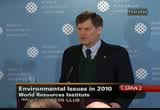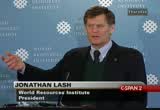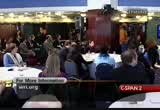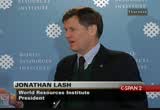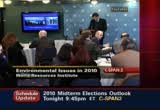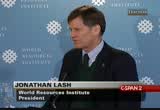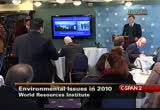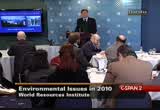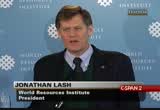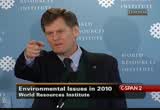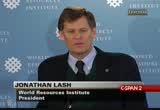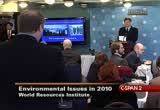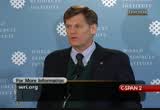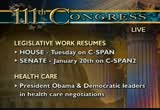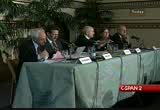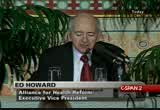tv U.S. Senate CSPAN January 8, 2010 12:00pm-5:00pm EST
12:00 pm
seat, and, the, democrat who will probably run, blumenthal will probably win that seat. that, he did something to help the party. i don't think that is the case with dorgan. i think republicans have a good chance of winning that seat. it's really rare for a president's party to gain seats or to not lose seats in the first election after the president was elected. it's, it is almost always a time when the president's party loses seats. when you add to that, the fact that this president's been very, very ambitious in terms of the number of major kinds of controversial issues, he's pushed in the first year, first two years, of his presidency, by that time, a lot of which, you know, generates a lot of
12:01 pm
opposition. whether it's, buying part ownership in companies, or, the huge bailouts of financial industry, or, health care, all of which are very controversial no matter which side you're on. i think, i think democrats are going to take a bath. i think they're going to be really hurt in the, in the elections. does that mean they will lose their majorities? i don't know if will be that bad but i think republicans are going to gain seats, partly because of just the natural way it unfolds. in these off-year elections. and the other part is simply that, there are a lot of issues out there where people are taking positions based on their ideology that are not what their constituents want. and some of them are going to pay a price for it. >> thank you. . .
12:02 pm
12:03 pm
now, i will say that i think brian is right. i have myself been critical in the past of having everything be open, because when everything is open, you have the press therefore everything, including all the committee meetings, it becomes very hard to reach a compromise. you know, because everybody's watching to see whether you are going to stay true to your position. so open and sometimes works against the government by locking people in. but that's not the reason. they are doing it this way. this time, they are not trying to avoid a conference in order to be able to preserve the right, the ability to compromise. they are avoiding a conference in order to make sure that they can just ram through what they want. and i think the press is completely right to complain about that. it's really not up to the president, what the house and senate decide to do.
12:04 pm
it would be helpful if you would keep out of it, but this is up to pelosi and reid and the leadership of the two houses to say we're not going to play those kinds of games. it may be harder for us to prevail if we do it the normal way, but we're not going to go behind closed doors and do everything in secrecy. you know, that won't help them in the election. it certainly is not good for government. >> thank you. >> thank you, mickey. [applause]
12:05 pm
>> according to government, 80 percent of afghans make their living through farming. >> good afternoon, and welcome to the department of state. i think we have an unusual, if not unprecedented lineup for this afternoon. we are thrilled to welcome the secretary of agriculture, tom vilsack, to the department of state. we are also thrilled to have on hand our newly minted administrator of the u.s. agency for national development, of course, our intrepid special representative for afghanistan and pakistan. you know, we have travel plans for these gentlemen in terms of heading to the region in the very near future. we thought it was a good time to
12:06 pm
talk a little bit about where we are in the subway and components of the strategy the president announced last month. and in particular, the centrality or the core aspect of helping to rebuild the agricultural sector of the afghan economy. so we will start this with secretary vilsack, who represents really the whole of government approach to our strategy as the secretary and the presidentpresident has emphasized. and then he will talk about the aad purport of this, and then richard, i know we are trying to squeeze in this briefing before the president speaks, but we were just kind of put this in the broader perspective of our strategy. thank you for coming. >> thanks for not. i appreciate the opportunity to be here with administrator sean and ambassador holbrooke. i think it's fair to say that
12:07 pm
agriculture is the top notch security priority for the united states government in afghanistan. i am looking for to travel to afghanistan to visit with officials from the afghan government. 80 percent of afghans earn their income from agriculture. 35 percent of the afghan gdp comes of agriculture. 50% -- >> we will right now lead the state department briefing to go live to the heritage foundation. we have fixed the problem, and we will bring you this discussion on the 2010 midterm election. republican pollster kellyanne conway is the guest speaker. this is live coverage on c-span2. >> good afternoon and thank you all for venturing out on such a cold january day here in washington, d.c.. although it's a lot colder other places around the country. and around the world. welcome to all of you here in the nation's capital here at the heritage foundation with us, and to all of those watching on
12:08 pm
c-span. all around the country and the world. this is the january conservative women's network, and i'm michelle easton, president. special thank you to heritage foundation, brigitte wagner who is such a wonderful partner with those. every month we bring you the great women leaders to hear from here at the heritage foundation. today we are delighted to have kellyanne conway to help us kick off 2010. as ceo and president of the polling company, kellyanne has provided primary research and advice for clients in 46 states, and she's directed hundreds of survey projects for statewide and congressional political races, trade associations, and fortune 500 companies. and kellyanne has a fabless online publication called women trends and is published six times a year now.
12:09 pm
even though the "washington post" recognized kellyanne conway as the most accurate predictor of the 2004 elections, and a further crystal ball award. kellyanne is one of the most quoted and notable pollsters on the national scene and she is appeared on more than 1200 radio, television news programs, including all the major networks and cable news channels. justice moore, congressman mike pence from indiana, who is also the chairman of the house republican committee, announced that kellyanne and her company were to be his official pollsters. in 2005, kelly and co-authored a critically acclaimed book, what women really want, how american women are quietly erasing political racial and religious lines to change the way we live. her co-author was a little. but what a traffic book that was. i would recommend it to you very highly. in 2008, the clare booth policy
12:10 pm
institute awarded kellyanne are conservative leadership award and we were very honored when she joined our board of directors this pasture. kellyanne also love to go on campus and give campus lectures. so if you're a student listening and you would like to bring kellyanne to your campus, to have some ideas for the aikido often here on college campuses, please contact us. now, kellyanne grew up in new jersey. where she was valedictorian of her high school class. and not everyone knows that when she was kellyanne fitzpatrick, a single young woman, kellyanne ke was crowned the blueberry princess. [laughter] >> she's also been numerous times in the great american conservative woman calendar, including this year's calendar, the 2010 counter. here she is, check her out in august. and she's also on our great
12:11 pm
american poster here. and the calendar poster are available on our website. for those of you here today, we have some extra copies of the counter on the table outside. kellyanne is a magna cum loud graduate in washington, d.c., where she earned a ba in political science. she studied at oxford university. she was elected phi beta kappa, as she holds a law degree with honors from george washington university law center. in addition to all this, kellyanne as a wife and a mother, and just this past november, she gave birth to her fourth child, a beautiful baby girl. [applause] >> speculate and and her family make their home in northern new jersey. please join me in welcoming kellyanne conway. [applause] clec thank you michelle.
12:12 pm
i get to thank my mom for having you write that introduction. [laughter] >> really appreciate all of you for breaking the element and the fact that congress is not in session. clare boothe luce policy really do smart things that they allow their speaker to speak and then there is lunch. so as you have visions of sugar plums and ham savages dancing in your head, the speakers get to talk which i think is very smart. i can't necessarily say that my children, i have boy girl twins who are five, and then i have a daughter who is almost too, and a daughter who's to muzzle. i can't necessary say my children are born conservative. the only guy to that my husband and i have is that they be philadelphia eagles and new york yankees fans. but allow me to share with you that it just so happens on the schedule delivery, that when charlotte was born, charlotte was born the day kelly spitzer had to resign as governor for his extracurricular activities in new york. and she was born in new york and
12:13 pm
so she had to replace the liberal governor with a conservative baby girl. and just this past november, banesto was born the day before election day in new jersey. so we replaced jon corzine with the nasa. you're going to have to do your part to help build the conservative women's network. i do want to thank really from the depths of my heart, michelle easton and the clare boothe luce policy institute for helping to bring here today. and for all the work they do on our college campuses in fortifying an encouraging and villages giving an outlet to conservative women across this country of all ages. because i don't want to choose a conservative young women are i can anticipate always be young so i want it to continue and be in a just and ever. i want to thank brigitte wagner who is an old and dear friend. none of you can believe, this woman is a grandmother.
12:14 pm
can you believe it? this is what grandmothers look like now. i shout out to marley, another member on a remember of our conservative women's network and want to thank the heritage foundation for hosting this. but mainly for allowing me to come into the building and not have to remove my shoes and give me a full body scan. i very much appreciate that, heritage foundation. [laughter] >> so i may post. what does that mean? it means people say what he do and i say i'm a pollster they asked me to help them with their furniture. that i can't do that i have absolute no artistic skill sets whatsoever. i thought i would start today's discussion with a couple of some of my all time and more recent favorites, stupid poll questions as i called and. you have all been treated to polling questions, right left and center from different media outlets and private pulses and different entities. i think he would put in context am of the more i'm using examples of what are being asked, i wanted to share them with you. these are some of my most recent
12:15 pm
favorite. june 2007, who do you blame, should be home, who do you blame for the recent increase in gasoline prices? here are your choice of. oil-producing countries, oil companies, president bush, americans who drive vehicles that use a lot gaskin or normal supply and demand pressure. so does president bush still being blamed for everything. october 2004, how much bling do you think the bush administration could get for the shortage of flu vaccine? a great deal, a good amount, only some, or hardly any. now the presumption of the question is that the bush administration should be blamed for the shortage of flu vaccine at the time. 69% said they didn't blame him or the administration took the question was asked recently about swine flu response but it was asked approval or disapproval. 57% approve, 40% disapprove in the way he is handling the quote sign to respond that but not a blame for the shortage of vaccine.
12:16 pm
here's one. april 2071 of the three major network. and i quote, which of the following do you think is the primary cause of gun violence in america? here are your choices. the availability of guns, that way parents raise their children today, or the influence of popular culture such as movies, television and internet. absent from your list of choice is the person who pulls the trigger. with a gun. and this one of course is totally generic did not refer to any one individual or specifically. newsweek september 2008, do you have reservations about electing a woman vice president who, a., has a new child with special needs, b., a teenage daughter who is pregnant? but the results are really what's astonishing. its astonishing anybody spend money especially they're losing money on those questions, but 80% said they had no reservation of electing an unnamed woman vice president who has a child
12:17 pm
with special needs. 91% said no reservations for a woman who has a teenage daughter who's also brigadier but i think you get the joke that even if fathers don't. let's talk about 2000. hot issues, hot buttons, hot candidates, what we see happening. although bit of perspective. 2008 politically was off about individuals. the main narrative, and a discussion point for all about individual. hillary clinton, perhaps the first in a president. barack obama, perhaps the first african-american, ultimate and was elected as such. sarah palin, big surprise pick in 2008. as john mccain's running mate. much of the polling question, much of the media coverage, much of the discussion at the watercooler and over the cappuccino counters was about the individuals who were running for president. 2009 was a shift away from individuals and back onto issues. we saw this when you look at the tea party goers, and what they were talking about, these tea
12:18 pm
parties. fiscal accountability, the exploding debt and deficits, spending money on health care reform, bailing out wall street bonuses, many of the code, being a jerk neighbor subprime mortgage or a great deal of concern about issues, particularly fiscal issues. the town hall meetings that were predominately centered around health care, health care not as a heartstrings issues, as i think the administration was banking on that health care which is the same as a heart sings issue, but health care seemed to an economic prison by many of these concerned and nervous citizens who are taken those concerned and that anxiety to these town hall meetings. we were at a very issues time in our political environment. that's a good thing. i think all of us should be happy about that. right, left and center. but as conservative women. we don't lead with argenta. we lead with their ideology. we want to talk about issues. individuals are just conduits for those issues, but the issues
12:19 pm
are evergreen. the issues have shelflife. the issues must necessarily survive changes of controlling in congress or state legislators or governorships. and those are what are enduring, and i'm happy to report in anybody's data, that is really what is dominate right now that i think 2010 will be the same. the major theme for 2010 are security and affordability. and i think they have been for quite a few downs for more than issue driven because when you talk about security, to someone it may be capitalist or social security. for somebody and maybe a fact that the transportation security administration, tsa, still has no head. there is no one heading up the tsa as i stand before you. the nomination was made by president obama eight months into administration. in september of 2009, and that individual has still not been confirmed that the nomination is being held up because as the "washington post" reported on christmas eve excuse me news he
12:20 pm
did, in addition, there is some comes that he abused his authority while an fbi agent and not once but twice digging up dirt on his ex-girlfriend's new boyfriend. people are concerned about that type of abuse of authority or the tsa apparently couldn't turn, put the on button on the cameras at newark liberty national airport. those weren't working -- they were recorded they were straining but nothing was recording for six days, ladies and gentlemen, we have to be concerned about this that the president said yesterday it's time for citizenship, not partisanship. fine, then let's have a tsa that work. by the way, let the summary of who can actually had out our security agency. our administration. and while we are speaking of citizenship, not partisanship, let's blow the secret doors off the hinges for these closed doors secret -- i couldn't find the door, let alone open it. health care negotiations. negotiation by definition does not occur behind closed doors. the american people were told he would have a seat at the table.
12:21 pm
this candidate obama said this would be different from hillary care, that you would be able to see and be a part of the health care negotiations. and i can assure you having just come across capitol hill at a meeting of this type, they are not open-door. nobody can even find the door it seems. this is no way to be decided the fate of probably one of the most significant pieces of legislation in a generation, if not to. so i think that these issues are very important to come on to talk to you about polling numbers today. i do want to do a quick preview of obama's first year in office, and his approval ratings generically and on a bunch of issues. and also a number of his attributes, because this is somebody who ran on monosyllabic feel-good phraseology like hope and change. does make for great campaign sound bites, easy to repeat, easy to understand, easy to nod or head in agreement. but specifics and governing are very different. and i was a bit much more difficult tasks than the matter of hope and change.
12:22 pm
when you're done making history as a candidate you need to start making policy. it needs to really heed polls and public opinion. i know many elected officials and many voters out there are skeptical of polls, or they say, oh, i lead by example. i lead a michael vick i don't listen to poulter polls, however, if taken correctly and scientifically and artistically drawn fairly to question, not perhaps like the ones i read your letter, but polls can be a very important touchstone to we, the people. it gives us an opportunity to tell our elected officials in our opinion leaders what it is and is making us anxious or frustrated. what our expectations and desires and hopes are. and some of the best insights i have ever heard are from individuals responding to polls or individuals in focus groups. there's a certain wisdom and common sense and richness of opinion and knowledge that comes from we, the people. so i hope more elected officials
12:23 pm
will actually look at the polls than not, if they are scientifically and properly drawn. so what have the polls is that all throughout 2000 nyquist added that his polls have said the same thing. the number one issues this year, the entire year, have been jobs and the economy. that's it. when health care started to spike up to number two or number three on the list of issues, it wasn't because people were saying that's a great idea that you are talking about health care. it's also the number two in every issue in many polls now because people are worried that when they hear and see me actually come to pass that that's a very important and post it when you see something as a number one issue, it means there's a concern that what they're saying, reading and hearing about it may not be the best idea. but if jobs and economy are the number one issue, even today's jobs report as of this word came out and shows unemployment still at 10% nationally. it was six-point 8% right before the last election, i have the
12:24 pm
numbers right here. heading into 1994, unemployment was under 5%. so if it's at 10% now, 1984 on the planet was 5.6%. last year six-point 8%, now 10 percent of these are the governments numbers of course. if that's the number one issue, then why hasn't it been the number one issue? i think that's a question most voters are asking themselves. that's what's concerning the. why hasn't been a bigger priority to up in the mexico city policy and force u.s. tax dollars to go to fund abortions internationally, which 82 percent of the country is against? why is it so important to bail out wall street, to bail out detroit, to make sure that certain mortgages are protected, even though people are saying those are not the number one issues for them. why is it important to flight to copenhagen, not once but twice?
12:25 pm
so i'm not saying that to be smarty, so much as i am asking question, why aren't we listening to people when they say they are starting for jobs lexa they're looking for economic rebounds. why do we look at the 16 million plus women in this country who currently owns all or part of a small business, and think of the untold millions of other american women who would love to harness their entrepreneurial spirit and create a little bit of a nest egg in flexibility and ownership for their small businesses? why can't we allow them just to flourish rather than try to suffocate them from the beginning? and so i want to read some of these numbers do you. i'm looking at over 30 crosstabs right here, and we compiled this from a number of national and publicly released poll so that the sample size is taken from over 3000 people in each of the three month periods between january 2009 and january of
12:26 pm
2000. over a full year now. president obama's approval ratings have declined among every single group with the exception of african-american voters. he is up five-point in his approval rating. is down one among self identified liberal democratic is down 13 -- excuse me down three among democrats. down 15 among independents over the past year. he stands 16 among men, 15 among women. every measure, both genders, every income group, every age group, every geographic group. all levels of formal education. every marital status. down in his approval ratings. and i am second to no one in talking about the unbearable lightness of approval ratings how people don't go to the ballot box do i like you, are you charismatic, do you appeal to me, do i feel favorable to you and does a critical mass of america feel favorably? but this is a president who,
12:27 pm
when running in the campaign, ran an awful lot on the appeal and the likability that if you go back to many people who endorsed him over hillary clinton, early on they would talk about that very thing. they've talked about his appeal and his charisma, his qualities. so it is fair to look at these as measurements that i was on tv last night, and including president bill clinton was still talking about president obama's generic approval rating. so let's talk about it for a moment. let's show that based on publicly available media polls, president obama's approval rating has declined precipitously and by double digits in the past year. why is that important? because he is not just the president of the nazis. is the commander-in-chief, and he is the leader of the party that currently holds very strong majorities in both houses of our federal legislature, many
12:28 pm
governorships, many state legislators. is the leader of the party and he's the chief messenger, all of those things. so it is significant. let's take a look at his approval rates in the approval rate the democratic party on issues as well. and on activity if you look at issues, foreign policy, upside down approval rates on foreign policy. on iraq, on afghanistan. illegal immigration, negative 22 disapprove, approve 36% approve, 58% disapprove of according to cnn's walt this past november. scene and again unemployment upside down approval raise. the federal budget deficit. the war in iraq, taxes, health care policy now. so all of these measurements by anyone's account are not voting will really on these issues. and on attributes again, if you're running based on activity, if you're talking about generational transformation, if you are talking about hope and change and you're talking about helping the middle class and having a clear vision for the country,
12:29 pm
then it's fair game to ask these questions in public. cnn polls again, between last year and this year, inspires confidence down negative 12 from last year. is a strong and decisive leader, president obama down 18 points from a year ago. on his intro worthy, down 1 13 t as a person you admire, down a. will unite the country and not divided, gent yesterday said it is time for citizenship on national security, not partisanship. down 26 on his own measurement of the will unite the country and not divided. has a clear plan for solving problems down 19 points. so these are all measurements, attributes, issues, generic approval. what does it all mean? it means people are actions that i think it really does short shrift and is very dismissive of our concerns citizenry when people who are showing up to tea party meetings and process in the pouring rain who are taking a ride to the members of congress, republican and
12:30 pm
democrat, this past summer about health care. it is totally dismissive and unfair to them to say that they are angry, they are irate. they are, look at them. they are nervous. they are anxious. . . coupled with, an incredibly enormous price tag, and a great deal of uncertainty. 500 billion in medicare cuts.
12:31 pm
over 100 some taxes americans for tax reform group estimates. new regulations. penalties. people are actually looking into the health care reform legislation is constitutional. if it doesn't violate proscription against excessive fines and punishment you can go to jail or pay a huge find for not having this kind of a program. all of these are very legitimate concerns people are -- security taken to their members, security and affordability. people talk about security. it is also national security. it can be national security and health security and security of certainty. affordability, that can be taxes debt, deficits, could be housing, college tuition. could be just basic cost of living and quality of life. that could be entrepreneurship. kitchen table economics. wall street, main street. all has to do with affordability. what we're hearing for voters going into 2010.
12:32 pm
much has been talked about with respect to new democratic retirements and ones that i think are imminent as wells and how will that bode well for republicans? it may, i actually think it bodes better for conservatives. everybody, many people laughed a year or two ago when we talked about how conservatism is on ascendency and president obama was elected and democrats got reelected to both houses and federal congress and to a number of governorships and they have got 60 votes in the senate. 60 being al franken or, arlen specter or combination thereof which doesn't matter turns out they can't pass many things they wanted to pass anyway because of their own caucus. so we're not a center right country anymore, are we? you read all the stories, some written by republicans, republican party is regional party and irrelevant and we'll be one-party system and all. the fact is, that, however the ebbs and flows go with party politics, conservatism has been the dominant
12:33 pm
ideology and philosophy in our country for a number of years now. anybody who decides that, look at anybody's polling shows conservatives, 40% of the americans call themselves conservatives. two to one the number of people who call themselves liberals. ladies and gentlemen, this is why liberals don't call themselves liberals anymore. they read the same polling data. they know that they call themselves progressives and spent a pretty penny coming up with that term progress sifsz. they, and i'm not even sure what it means. car insurance i know. [laughter] so if they won't call themselves liberals then perhaps you should. why is that? sounds so shop-worn you tried that before. again, i mean, even nancy pelosi doesn't stand there who represents a fairly liberal and quote, progressive district and say, you know, in this congress, we're going to grab your guns and increase the number of abortions and increase your taxes. nobody talks like that.
12:34 pm
nobody talks like a classic liberal. they all run a little bit more centrist when they have to run in many cases and it is no other than william daly, who served in the bill clinton, president bill clinton's cabinet who this past week or two had an op-ed urging the democratic party to moderate its views. does this sound familiar? that was the call for republican party, moderate your views. yet you have, 16 republican kong women, about half of whom are pro-life, half of whom are prochoice what i can tell through public information. yet all of them unanimously voted against health care, in part because it would change our law, and allow federal funding for abortion. that included the pro-choice women in the caucus. that included pro-life women in the caucus. they agree on that part. this is where the conservative movement and republican party are different. you have naral we'll primary anyone who votes for nelson
12:35 pm
amendment in the senate and stupak amendment in the house. this is religion to them. they might as well have one. well come, welcome so the faith-based crowd. there is no compromise there. we're able to welcome in the republican party people of both views. conservative movement is on ascendency because we're taking along not just 40% of americans who call themselves conservatives but huge number of independents. 60% who voted for barack obama just a year ago and many of whom now calling themselves conservatives and aligning more with the republican party. before you get all excited about it, moderates are still by and large aligning with democrats. independents are aligning themselves with republicans. there is different. moderate and independent are not interchangeable even moderates and independents. unfair to use those interchangeably when looking at the political landscape and possible realignment.
12:36 pm
when, when people are thinking about the independent vote, they're not just independent because they are declaring independence from both parties and refusing to pledge their allegiance. in fact over 60% of the independents disapprove of republicans and disapprove of democrats in the congress right now. that's their job. they're independents. but many of them are libertarians also. you see many of them showing up at tea party and town hall meetings and taking action. i think you will see many of them start to run for office. just as you're seeing democratic retirements you're starting to see number of conservatives come out of the woodwork say 2010 is my time. i must get off the sidelines. many of them were always, you know, sort of civicall civically-minded dutiful voters and sat it out in 2006 and sat it out some of them in 2008, particularly 2006. why? because they were not going to vote for republicans acting like democrats. i'm not sure they're not going to vote for democrats
12:37 pm
who are acting like democrats. they did not vote for republicans acting like democrats. a lot of people look back to 2006. republicans lost 30 seats because of particular scandals of bob ney or mark foley or duke cunningham. i think we lost their seats because of that we certainly didn't lose geographically disparate seats idea logical different members. gill in minnesota or j.d. hayworth in arizona or jim leech in iowa. clay shaw in florida. very different members of congress. very different records in congress. there is something going on. because many would-be republican voters, most of whom are conservative stayed home and sat it out. they are conscientious objectors, not because they don't pay attention to politics but precisely because they do. they are coming back. looking at polling now, i'm debating whether the likely voter model makes much sense this early on in 2010. we all do the likely voter
12:38 pm
model. i have been one of the major proponents of having even more, sophisticated screens to find likely voters. not just past and prologue. can't use voter list because you're necessarily leaving out young voters and new voters. immigrants who can now vote who have been naturalizing now have citizenship and can vote. leaving out people who have moved. very mobile country and you're leaving out people who have been lapsed voters many years now feel like a reason to vote. if you look at 2008, versus 2009 in new jersey and virginia, see voting elector rats in those states just a year apart were so different. using likely voter model from '08 or 09 for 2010? and why would either one apply? why in a presidential year when president, when candidate obama did a fantastic job of making virginia matter and showing up and having dozens and dozens of offices there, but a year later bob mcdonald
12:39 pm
wins state for governor and republican, conservatives win up and down the ballot. which one is likely voter model for 2010? i think it is important to be a little more open-minded and inclusive when it comes to who might participate in politics in 2010, and, more to the point, who might sit this one out. that is something that afflicted republican candidates in 2006 and 2008. and the question is open now who that will affect in 2010. you can't be somebody with nobody. that's why candidate recruitment is so significantly important. and i'm not a bean counter. i don't believe in leading with gender in talking about immutable characteristics as being particularly important in identity politics. particularly for conservative candidates. at the same time, we are starting to see an uptick in number of women filling up the pipeline and running as conservatives this year. and i think that's fantastic, if they want to do it.
12:40 pm
that's the big if. i'm always asked by media why are there only 17 united states senators out of 100 who are female when women are 53% of the population and 53% of the voters? look, you've got to want to run. you have to want to overcome a great deal and you've got to really want to, you've got to believe that politics is the best place for your energy, for your talent, for your resources, for your future. and for many women it is not just the fire in the bellly anymore. it is bile in the throat. you have to swallow an awful lot to run for politics. i give enormous credit for those who step up and do that. but, the pipeline has been a little bit weakened and diminished even, center for american women in politics and a lot of other watchers of women running for office have noted that, that many women have stopped running for office at a tremendous clip. at the low, even lower level, state legislative level, statewide office level. and i think, the average
12:41 pm
woman, particularly young women, watch 2008, on paper, and, as a mother of three, very small girls, get excited on paper about, a woman running for president, a woman running for vice president. in practice, actually so deflating way some of these women were covered, coverage on hairdoes and husbands and host coutre', what they were wearing and rather than what they were saying parsing many things said. i hate to report, they were written by female journalists or male journalists who really should figure out those issues because, why are you covering what a woman's wearing rather than what she is saying running for president or vice president of the united states? who has got the problem then? and i don't see that changing anytime soon. i actually think if you look at the coverage that's been going on for a while of female candidates, it is just amazing different questions get asked. a woman who is running for congress. she has five children and
12:42 pm
she was asked very recently by a journalist, local journalist, you know, always with the, squinted eyes and ernest voice and, can you do it all? can you balance it? i mean who's going to watch these kids? and i know that, who do you think will watch these kids? that question, there was a female commentator made the comment in and around that poll at the time, about the 3:00 a.m., famous 3:00 a.m., that hillary clinton had run when running for president. a twist on it was, if, phone rings and vice president palin gets the phone call at 3:00 a.m. and one of her children is really sick, what is she going to do? and i'm thinking may be a fair question, maybe but, why didn't anybody ask john edwards? when the phone rings at 3:00 a.m., and your wife who sadly is very sick, is there and you're not, do we have a backup number for you? where do we find you at 3:00 a.m.?
12:43 pm
[laughter] never asked. i may have missed that news story. if anybody sees it, please send it to me, because i may have missed that. not about double standards. really about, how ridiculous some of the coverage is. i would get that question all the time about, governor palin. she was, first it was, she can't do it because, special needs child. she, take her out of the equation. talking about, the way female candidates are covered by and large, particularly conservative and pro-life ones. can she do it? who it was, i'm really worried about her children. god, i read your columns. i don't even think you like children [laughing] you're worried about her children. so, i stopped getting upset about it and of course you want to take the phone calls and be helpful, and i like a whole bunch of these journalists and work with them routinely but i really thought it was sort of a net they are world kind of
12:44 pm
equation, netherworld. they maybe don't know anybody like that. they don't know a person with five children. who does it with household support and family members and all the while with five children and all that and making school lunches. i quickly realized thing to say there is, the same thing i would say if somebody asked me when my belly has been out to here the last five years almost consistently, you know, they are thinking hmm, can she handle my work and that baby after that babe's born? well, guess what? like sarah palin, i thought, she doesn't farce as i can tell, who knows. farce i can tell she doesn't have a boyfriend. she got 13 extra hours a week i would think [laughing] the time you spend with the, time you get ready to spend with them. time you spend covering up you were just spending time with them. the time you spend planning to be with him and cover up that you were just --.
12:45 pm
it is exhausting [laughing] apart from my moral objections, the logistic it is of adultery completely confound me. [laughter] and as far as i can tell, she doesn't play golf. [laughter] i don't either. maybe i'm jealous. but right there again, that gives her like, an extra, 15 hours a week i'm told, seven on saturday, eight on sunday because they go for brun which or drinks or whatever it is. i give her 13 extra hours away from boyfriend. 13 extra hours, no golf. five 1/2 extra hours per child or for 3:00 a.m. call from national security advisor. a really light way of breaking down how ridiculous it can sound sometimes when people are asked that question. but even in the case of mrs. clinton, having to put her civil what i call campaign uniform, beginning in 2000 ran for u.s. senate and elizabeth dole running
12:46 pm
for u.s. senate in same year. in north carolina. mrs. clinton in new york. both husbands ran against each other four years earlier. will they question intelligence or credentialals and hillary clinton and liz both dole. they had to win back column inches of coverage by wearing the campaign uniform and campaign uniform hairdo. as i often observed i never see the stories about bad combovers and punchy beer bellies in congress and there are many. [laughter] the other thing going on in 2010 that i see being as very hospitable to folks who want to run for office who maybe run for office is, in large part having president obama to thank for that. in other words, i think biography is very important to people. voters want to know who the person is behind the politician and secondly,
12:47 pm
this whole idea that you have to sit in corner and wait your turn and be next in line, or, have, held certain offices along the way or paid your dues within the system, has been upended and not just at presidential level but that is the most obvious, and probably, consequentialal example but at different levels too. a 25-year-old was sworn in as mayor in new jersey the other day, okay, that guy was born in the same year that, like, suits in my closet were made. i admit i shouldn't have them in there but, that's just really jarring to think that he was born the year i was senior in high school. the year geraldine ferraro ran for vice president. when you put it all together you realize this whole credentialism and structuralism and wait your turn and pay your dues in the system i think it is a great impetus for people who always considered their greatest contribution to politics to be the 60-second voter.
12:48 pm
i vote and dutiful. i gave, 10 bucks or 20 bucks or 50 bucks there. i did the get-out-the-vote. i drive politics with other people and drive seniors to the poll. i take little ones into polling place. now is time to do more than that if you're so inclined but actually get out there and throw your hat into the ring. let me just, i wanted to have time for questions. but before i do that, let me just mention a couple of other statistics that i think are fascinating going into 2010 with no presidential race on the ballot. one is, there are 34 republican members of congress who represent districts that president obama-careried in 2008. there are 4 the democratic base members of congress -- 49, that sit in districts that john mccain carried in 2008. right away you start with 84 districts just by using that simple linear measurement, 84, 83 districts that would seem to be in some kind of
12:49 pm
play. then there's a very fascinating number you don't hear very often. 25 congressional districts that are held by democrats who won in 2008, but they are districts that president obama won in '08 but that president bush carried in 2000 and 2004. this is also why, sort of looking at voters through a very simple linear prism, you know thinking about them in terms of, they always vote republican or always vote democrat or want to make history or don't want to make history or stateist or progressive, really naive and it really discredits how people are making their decisions. if you open up anybody's handbag right now you would find six different brands of the same kind of products, whether it was, vitamin or prescription, or, beauty products you would find all these things. if i opened anybody's pantry, i would not see all the same kind of product. we consumers are brand loyal but not brand monogamous and
12:50 pm
the same is true in politics that is something to take account of in moving towards 2010. two of the most important demographic groups in 2010 are unmarried women and small business-owning women and aspiring small business-owning women. as i mentioned before in addition to 16 million plus small business-owning woman you have same number of entrepreneural aspiring. they don't believe in institutions and security of big business in america anymore. i should say business america because there are so many layoffs and so many regulations and taxes and uncertainty. and they also want some flexibility and ownership of something to call. they also have a great deal of confidence in their own talent and their skillset and there is access to capital with many of them. access to personnel and access to talent and access to clients. so they're very important and they're up for grabs. unmarried women, unmarried women favored barack obama
12:51 pm
over john mccain by 41 points. unmarried women between ages 18 to 29 favoredded barack obama over john mccain by 55 points. 55 points. they're all ren any gads do whatever they want, do the same thing practically. but they favored, they favored. and i think that is a real cautionary tail to the conservative movement and republican party because unmarried women are in their 20s, 30s, 40s, 50s. women are staying married by choice and circumstance these days. you have many women unmarried running their own businesses. who are, getting their degrees, who are, out in the workforce, who are the conavigators of some decisions for elderly parents and aunts and uncles and other relatives and they don't have children of their own but spoil the heck out of everybody's else's children. this is a huge growing contingency within our population. and many of them, we've got
12:52 pm
to admit they're financially sophisticated. they're buying their own homes. they're availing themselves of acute triments of ownership society. they're not waiting to become owners and certainly to be taxpayers and entrepreneurs and voters. so this idea you've got to wait until people achieve certain stations in life to appeal to them i think is very short sited and very -- shortsighted and very naive and real cautionary tale and invitation more than anything for us to recognize demographic trends and what we can make of them. my, michelle mentioned, my colleague celinda lake, democratic pollster, who does wonderful work for her side of the aisle and who is my coauthor of that book, what women really want. we chose the title, hope cynically men would think about sex and buy it and be best-seller and be disappointed it was written by two pollsters. i'm sure you can find the book years later at dollar stores, full price, one
12:53 pm
dollar. but celinda said something on npr other day. she and were on a show with "washington post" reporter, who written a book, cracks from the ceiling on campaign trail with governor palin and senator clinton, two years ago now. celinda said something at end. broadcast was quite wise and quite prophetic. she thinks first female president will be republican. many people believe that but doesn't get credit from the other side. answers she gave are exactly right. that republican woman who will come from another elected position, most likely or from business, will be able to show both sort of, now these are my words, financial sophistication, business acumen, strength and forcefulness on matters of security, and military policy and foreign policy, but also at the same time, in business and on financial matters and yet still be
12:54 pm
able to show leadership and vision on what, unfortunately have been called the, quote, women's issues like social security, health care, education, since they're everybody's issues i don't think they're women's issues and women are smart enough to take care of the math and take care of fiscal issues. i think that is quite prophetic statement. i don't think it will happen tomorrow but there is wisdom in that. i think it also shows you why certain conservative candidates for office who are female scare other people because they, they're actually worried that these people can assend. and, if the people weren't a threat they would be ignored. last time someone didn't bother me i didn't bother with them. somebody really a threat to your constituency and philosophy and world vision you've had, of course they're going to be attacked. that ladies and gentlemen, is certainly no reason not to run for office. i think it is tremendous reason to run for office. the best thing i think that
12:55 pm
any of us in this room or anybody watching who is so inclined can do in inviting being more well coming to women to be part of the conservative women's network, simple. answer the question in seven seconds 70 seconds seven minutes, 70 minutes answer the question, if you're not asked the question. say it declaratively. answer the question, why am i a conservative? not why i'm a conservative woman? why am aconservative? answer that question, if you start out the answer with well, or but, or the same kind of, soft whispered, wincing eyebrow, crimped eyebrow, takened concern we get in questions i mentioned earlier. you're behind the eight ball. answer forcefully. i bet answers are multitude news as people in this room and people watching. for some fiscal issues. for some social. for others it is moral. for others it has to do with entrepeneurship.
12:56 pm
for others it has to do what you believe the proper role of government. for others you may be disconnected from politics all together and may be way i was raised. i was raised by four women. south jersey's version of golden girls. four italian adult women raised me and it is gift that keeps on giving but i don't remember a single political conversation ever, not once. it, for some people, that's enough. those leading cultural indicators, influences of what they're doing every day in their lives. we've got to convince people, when women say i hate politics, i don't like politics, i don't like anything in washington, they don't mean that. because politics is just a means towards the ends that they care about. so to say i hate politics means you really don't care which way health legislation goes. don't matter to you who is manning education policy or what is happening with the tsa we know nobody means that so, politics is just a means towards the ends that people care about. for you to answer that question, declaratively and unapologetically, here's why
12:57 pm
i'm a conservative and why i think it is important to get involved in the system, would be a boon to us. thank you very much. [applause] >> thanks so much, kellyanne. what a good talk, what inspiring talk. i feel ready to go out and fight now. we have a little bit of time for questions. we have two of the clare boothe luce ladies. with the mikes. why don't you let you call on people, if you would not mind giving your name and affiliation. go as long as we can. >> yes. hi. >> katie brown. i don't really have an affiliation right now but my question is, from your polling, do you, do you know, do you have any indication why young women went for barack obama over john mccain? because it seems to me that probably would be the opposite because, it seems
12:58 pm
like if you're young independent woman you would want more pro-business policies. if you want to start your own business. and, so wondering if you had any insights into that? >> yes. thank you. the question is, is about why young woman would have gone for barack obama over john mccain. and may i say so overwhelmingly. i already given statistic about young women and unmarried women. should have had to do with marital status. should have mentioned 55% of unmarried women between ages 18 and 29 favored barack obama over john mccain by 55%, married women between the ages of 18 and 29 favored mccain-palin by 12%. should have mentioned that more of a marital status gap than just a sheer gender gap or even age difference. but to answer your question, young people, young woman who is voting in 2008, basically all she had ever known in politics were bushes and clintons, in different orders. and, if she weren't,
12:59 pm
enamored with one or the other of those two teams i assume she would have gone with one of those two teams. in other words given mccain her vote and bought into the idea this is extension of the bushes eight years, or, maybe supported hillary clinton in primary or decided not to vote in the general election because of the bad aftertaste of the primary against hillary clinton. but that was not the case for many young women. for many young women their foray into national politics was barack obama. was his campaign. and let's give barack obama campaign a ton of credit whereas they had such focus and disciplined organization as campaigns, same type they're lacking now i think in governance frankly. one thing they did, really well, was use technology and use technology to connect with young people and make them feel included and a part of something big. how did they do that? they had a program essentially for one dollar you can sign up and get alerts and be part of the campaign now. if you pay a dollar, to a campaign and they're going
1:00 pm
to spend money keeping you informed, you are a money-loser to them but you're really not because, i promise, you are going to vote and get on facebook or something else, myspace and tell 100 other people immediately what you just said. even if 10% of them do what you just did, times a million people, it really starts to grow. . .
1:01 pm
>> let me also say it's nothing new. younger women and unmarried women voted in droves for clinton both times, voted for al gore. so it has lots to do with ideology. i voted for john kerry. so it does have to do with ideology. that is their right. in our freedom loving democracy. so it has to do with ideology as the. but you're onto something important that it's my entire point about not just looking to women through a linear box, if you're an aspiring doctor werner and you are of a certain age, then why are we just talking to you about taxes and regulation? why are we insulting you about same-sex marriage or abortion? or that you don't make money as
1:02 pm
he can't do the math. you don't understand who mr. feith is yet. yes, people do. i think technology is a big part of the. or whatever else you want to say about president bush or senator mccain, one of them, one of them refer to the internet laurel and one of them once said of google. cingular. so that coupled with you could pay a dollar and be part of my campaign and having a first book page and all that is quite remarkable. >> from a statistical standpoint, what would you say is the number one reason women would give for being conservative because the number one reason women get for being conservative is very philosophical and not specific issue base that is their view of government. it's that they believe government should do less, not more. that the government should do -- they are very constitutionalist and those ideas. in other words, when you listen
1:03 pm
to them talk, they speak about how if it's not prescribe to the government, then the government should not do it. they have a certain sense of federalism. they score much higher on basic civil questions, about federalism are about the supreme court does, what the congress does, who the members of congress are. so there's a certain nexus there, and i think that makes sense but it's got less to do with any one issue and a lot more to do with the basic governing philosophy. i think that's important because just as i was saying at the beginning of my talk, liberals -- they call himself progresses, remember, the only time that really hear people mention conservative like media covered is when they can choose the preceding adjective. right wing, christian right, abortion, opponents are anti-abortion conservatives, or bush loving or tea party going. they need to choose the adjective because they need to diffuse and dampen the potency of that word, conservative.
1:04 pm
because 40 percent of americans to consider themselves to be conservative. we all see written about are between democrats and are republicans. liberal is a much less strong word than democrat. that's why you see it. i really into the government which is why it's so important for us to always talk about first things in that way. yes? >> my concern is the politics of urban areas, especially here in the washington, d.c., area. we have a high amount of government workers that, frankly, a lot got raises. so we have a couple of things going on here. one is the view that they are personally going to profit from the continued growth of government. and then there's the unemployment that it is driving. have you done a poll whether male or female, because we all want to put food on our table,
1:05 pm
and most towns the largest employer is the government, is the school system. >> i've seen polls but not in a long time so i would be able to give you credible and recent results from my firm. but i have seen polls like that of government employees, and more and more they are restricted from participating in surveys. is becoming more difficult to survey them from some outside outfit. you do see a difference that i think we're question is going to be most important in 2010 and beyond, is how redistricting goes in the next -- after the next census. this is why it is so important for us to run people for governor who take it seriously, don't say redistricting, not that. bring in the number geeks for that. and being one, i can constantly say, unnumbered geeks are good. but if such important issues and republicans have usually gotten it wrong. they don't actually say by large
1:06 pm
in some of our state redistricting. is going to be important because the more you carve up districts to be, you know, uncompetitive, that's right, we have more now than ever. but also very monochromatic in terms of type of work you're seeing government employees or monochromatic in terms of type of ideology. that's very disconcerting. so i think it is important that one area i would say keep an eye on is, i think in a really good 2010, maybe some elect congressman jim moran in virginia district just over the bridge year, whose voters, he has a lot of federal government employees in his district. and maybe in 2010 we can get someone like that to retire or have a very close race, and that's because issues outside of work above their employment or beyond just, you know, then protecting themselves will be most important to them. but i think it's most important
1:07 pm
with the question you have is most important right now with the expected immediately jobs and employment as you say, but also with redistricting. >> the last question. >> my name is kate wright, and i'd like to ask a question in honor of clare boothe luce. regarding media and entertainment. i saw an old episode of friends last light, and it depicted mindset and an agenda more than storytelling. and from your point of view, kellyanne, do you ever do polling regarding entertainment and media? if you do, or if you have a sense of that, could you give us a little direction of what might work for younger audiences to help them understand why clare boothe luce even existed in such a high regard? >> well, if i understand your question quickly would be how to reach through me that it's a
1:08 pm
great question and it's increasingly an important question, given the diffusion of communication tools and media and the alternative media, as people move away from the three big networks by large for sources as we become a frankly a much less verbal population into mutation, and do it all on the keyboard it seems out with a point and click of the mouse. i think we'll go to war someday over e-mail and not actually declare war. that's very simplistic way of saying that young people want you to go where they are. and that was part of my previous answer about the barack obama campaign effectively using technology to go where young people. they will not come and find you. where they are is a little bit under the radar screen, but a little bit in places that you would already suspect. you can go and pull the nielsen ratings where young people --
1:09 pm
were people watching tv and what they're watching, by different age groups. i think what's important about young people, social networking tool should not be discounted as effective organizational and communication conduits. because they always come not to just tell people what you're doing and what's going on in your life and upload pictures of your weekend and what not. but really as sources of news and information for them. just on a slightly different angle with respect to entertainment and media, i would commend everman, phenomenal work that andrew is doing, really visionary and very bold. he also has big hollywood now. and he's doing a great job really pulling together a lot of hypocrisy and showing the intersection between hollywood and washington, and in between hollywood and the political left and all that.
1:10 pm
he put together these eight great clips frankly of candidate and nominate obama talking about open negotiations and health care. such as go to breitbart.clm. and it's important to understand how people, young people use media, what is asked to going on in hollywood and india. dazzler and is. it's not like he is here looking our turkey is there living it. so i think they've are useful tool. but we just can't say, young people, forget it. they're not going to get involved or their apathetic that they are lazy. they are only educated. it's unfair that they will get involved if they are asked. i think the last presidential cycle proved that. but where are they now? back on the futons doing nothing. bareback on the futons cauchy said no, they're back on their parents couches. [laughter] >> but they are not there to help get his agenda passed by this president and this congress, which is very telling.
1:11 pm
so they're out there for other people to message to and say now we need you where it really counts. notches in political campaigns and elections, but to help with policy, whether it's stopping policy or to help advance commonsense policy. and i think that people don't look at young -- they don't message young folks at a local level. people are very involved in your communities. young people choose where to look at that much more flexibility now in geographic choices and nobleness. they choose where to live now, whether to stay in a college town or move. data for marriage and parenthood until later, if at all. and so they're able to be a little more mobile and a little more flexible so they get more invested in the community are they on and having chosen to the. i would message them from the bottom-up. thank you very much. [applause] what a great talk, kellyanne but i have to take up my staff will confirm that all the women we
1:12 pm
promote and send out tuesday, i always tell them you are the most interesting. it's absolutely true. we have here are limited-edition clare boothe luce coffee mug with her famous saying, no good deed goes unpunished. [applause] >> and from heritage, i was so glad to hear you talk about conservative women and how principled oriented art and the constitution was. we all know that within, yeah, the confines of the trim and women who watches regularly on c-span. we had this great book that will be a great tool for all of you all to share with those women who are saying why are you a conservative? we still hold these truths at heritage images come out with a study guide, not out yet, we will be doing that so it would be a great tool for you to share with your reading groups. i know there are a lot of republican women's groups here. i wanted to share that with you. and also just is really terrific dvd that heritage produced recently, let me rise, which is about the program here in a
1:13 pm
district which is in jeopardy. congress -- the founder of d.c. parents for school choice. but this is an incredibly moving video. i would encourage you and for those watching, to search for it on google and let me rise. it's the story of the fight. i know you can carry this message forward. >> thank you very much. i think i can transfer this from a coffee mug to tea party mug. [applause] >> thank you all for joining us at the heritage foundation to the c-span audience that heritage.org will be posing as an archiving it on our website. for those of you here today, we'll have lunch across the lobby so you can ask kellyanne your questions. thanks. [applause] >> wrapping up this event at the heritage foundation, white house briefing began just over 50 minutes ago. we're joined that now in
1:14 pm
progress. live coverage on c-span2. >> this man is somebody who has sought over the internet to spread that sort of hate and perversion, and beasley to do harm in spreading the hate. odyssey, he is somebody of great concern. >> to what degree is your evaluation, by the fact he is an american citizen? >> it's complicated by intelligence matters. >> that's it. that's fine. >> given the disappointing jobs report, has the administration given consideration to that of a public service jobs program or any other vehicle for directly hiring people for the government? is that something that is on the drawing board and were? >> i have not heard it, not heard a discussion on that.
1:15 pm
i think the president and administration would tell you what we believe we can do through both a recovery act and to additional targeted investments, that the president spoke about in the summer, has created an environment where the private sector is hiring again. i truthfully don't believe there's a solution that only includes one sector in all honesty. i don't think there's just one way, or one positive thing that will solve the entire problem. obviously, over the course of the two years, 24 months, of jobs numbers that have been released since the official beginning of that recession, we are in excess of 7 million jobs having been lost. so we've got a long road to hoe in making up for that. again, i think i would point you
1:16 pm
to not simply what the president is doing, but in asking that that be expanded because there is a tremendous demand for these type of tax credits, as we've seen in a program that is dramatically oversubscribed, to use a term, in those that are seeking the assistance and help. and as you've heard the president discuss, we've got to -- we got to lay a new foundation for creating jobs going forward. we're not going to be able to depend on simply on consumer spending, or something on a housing bubble to fuel economic growth going forward. we've got to find and invest in new ideas and new industries. i think it's safe to say that for quite some time, when it
1:17 pm
came to building the solar panels and the wind towers and wind turbines, and a lot of manufactured equipment for clean energy, we had a number of foreign countries that were doing much better in addressing that demand than we were. and as the president has said often, the type of demand for these components and manufacturing is only going to increase. as we seek solutions for our energy problems. and we have to ask ourselves as a country, are we going to create those jobs and create those components, are we going to import those components from overseas. the president believes that we have an opportunity to lead the world in this type of manufacturing.
1:18 pm
[inaudible] does the president disagree with that? >> well, he's been asked this direct question about this scenario, and gave largely the answer that i just gave, which is if we don't -- if we don't -- if we don't seek to fill these jobs and fill this demand, somebody else will. somebody in another country. we have to bore down and make sure that this investment is a priority for us, to create those jobs now. >> we've heard over the last several days people like mr. brennan saying he let the president down. with virtually recitation of failures. what is the present himself learn from this and how does he plan to operate differently, given the new threats and the new information that he's learned? >> well, jeff, i think that first and foremost i go back to
1:19 pm
john and throughout the intelligence community. i think the president wants to ensure that first and foremost what we've identified through our review is addressed. i mean, i think the president -- the president is very serious about ensuring that what has been a divide as a shortcoming is addressed quickly, and done fully and thoroughly. doesn't want this review to be something that lays around on somebody's desk and that people don't operably take as important as he does. i think you've heard him say, and certainly i heard them say, in the situation room that the level of our failure was unacceptable. as he said, were it not for the brave citizens of the world on that plane, it might've been a
1:20 pm
catastrophic disaster. so it wasn't the system that prevented that. it was brave citizens. i think the president's going to ensure that john and others are fulfilling what do these reviews have shown, are the gaps in our system that has to be fixed. >> how will he do that quickly add more meetings with mr. brennan? is he going to be briefed earlier in the day? >> i don't think there's any change in his briefing schedule. i think obviously, john and everybody else understand the seriousness of the task that they been undertaking for the last, almost, i guess two weeks. and are serious -- the president is serious that it has to be fixed. >> just following up on john's, and frankly the going around the room that you describe the situation, did anybody offer to re-sign? >> no.
1:21 pm
>> either there or anyplace else because not that i know of anywhere else. certainly not in the situation room. >> the first week of february, are there any legislative issue considerations guiding when he wants to do it this year? and secondarily, is he aware of the internet storm over those who are begging him not to schedule the state of the union address on the night of the three-hour premiere of -- >> i will say this. i was at his own behalf of abc radio. [laughter] >> i don't foresee a scenario in which the millions of people who hope to finally get some conclusion of loss are preempted by the president. you can quote a senior administration official. yes, sir. >> robber, without going into the specifics of the week ahead,
1:22 pm
is there going to be economic or chop them and the president's public events to communicate that concern? >> well, again, i don't have it in front of me. but yes, there will be over the course of the next several weeks. i don't think just next week but over the course of the next several weeks. as jonathan said, we've announce a visit to a highly specific, to build off what he had done in allentown in the semper that he will do it again. there will be several events over the next few weeks on that topic. >> robert, do all of the transferase -- >> just one. i have now realized both the code and color of your sweater are of some import and significance. >> and i will be classy and not even bring it up. >> hard not to notice the bear bryant -- yes, that
1:23 pm
congratulations to your crimson tide. i did get a few e-mails from friends wondered if i would mention my excitement at the newly crowned national champion. so consider that having checked that box. [laughter] >> and will the schedule include a visit by coach sabin because i think sometime by the end of our first term. [laughter] >> we're talking alabama football code. >> i just want to follow up for a minute. do all of the transferees out of guantánamo need to be detained by foreign authorities? >> i will just say without getting into the details, there's arrangements made with countries that you transfer to. >> and does the u.s., is there a mechanism for monitoring, where those people are? >> i just don't want to get into that. >> what can you tell us about the meeting with president
1:24 pm
clinton? >> i did not talk to president obama after the meeting. i know that he was in town, unfortunate, for a funeral. and had a chance to come by and see both the president and the chief of staff. i don't have a readout though on what they spoke about. >> robert, thank you. very much. just two questions. considering the continuing reports of record worldwide cold, how does the president believe that there was justification for the millions spent on that conference to try to vote acceptance of global warming? >> well, i think one only has to step outside here, or visit where i used to work in chicago to understand that climate change is, and the record
1:25 pm
temperatures, that climate change is likely causing is with us. >> thank you. while he was in hawaii, did the president visited the hospital where he was reportedly born, which is which might? >> i don't believe i saw any reports of hospital visits. >> you attribute this where to climate change because i don't know specifically what causes today snowfall spirit or the coal that is gripping the nation. >> i would say there are, even in places that are not used to getting very cold weather, record cold. i think scientist will tell you that, whether it is in and around this country or throughout the world, that our weather patterns have been affected by a change in a climate. yes, ma'am. >> "new york times" and "washington post" edit dasher
1:26 pm
editorialized about a deaf good for certain acts of homosexuality. "the new york times" suggested that u.s. should stop funding to uganda and the bill becomes law as some of the countries of origin. if the law passes in uganda, will the administration continue to send foreign aid to countries that sanction the murder of people who are day? >> i will check on prospectively in the event that something like that passes. i would say that, that that type of, that type of legislation would certainly not live up to any record of universal rights and universal values, that i think anybody would say in this country. >> two questions. the first is, yesterday the president spoke about the need to move beyond partisanship to citizenship. this morning from our new york city mayor, rudy giuliani criticized the white house for
1:27 pm
two things. one was the closure of gitmo and the decision to put this detained terrorist in the criminal justice system. is that fair criticism? is that partisanship or grant citizenship to? >> i would say if one looks at what mayor giuliani says after testifying in the criminal u.s. criminal trial of zachariah miceli, calling it, i forget the fact phrase, but holding up the stellar record and the value system involved in our criminal justice system, i don't think that mr. giuliani has the record straight in his comments as it relates to that anyway. i think if you watch the interview, i think there were a number of things that didn't quite seem to jive with the better part of reality.
1:28 pm
>> does that include the terrorist attacked aggressively? >> and sort of interesting that the mayor of new york had forgotten that. >> the second question is you have no nominated dawn johnson, sec whether we had nominated crockett smarter. >> was the? >> that's right. >> i think i was pretty young. >> and i'm down 500 apparently. go ahead. >> city of renominated, what are you going to do differently to make sure she gets 60 votes to pass? >> sam, as we've talked about here, obviously i think one of the things that the president and the administration would like to see a change in the
1:29 pm
pacing of nominations in general being addressed. by the senator we have seen over the course of many months, i think a very intentional slow down of the work that the senate does. which i don't think sirs anybody in any political party well. obviously the president and the team will continue to work with the senate to get to the 60 votes that would be needed for ms. johnson to pass the senate. [inaudible] >> not that i'm aware of, no. >> the report says that incomplete and faulty database were part of the promise was the information technology with this and the counterterrorism committee did not sufficiently enable that. why doesn't the intelligence community have the technology it needs? >> well, i think in some ways, obviously there have been great
1:30 pm
technological advances, as you heard john talk about, and in many ways, what we've, the difference between the improvements that were added after the attacks of september 11 is we knock down walls between databases that were maintained in certain agencies. and in fact, part of what happened after 9/11 was there was actually intentional redundancy added so that different places in the intelligence community could have access to information that is gathered by others. i think what john and others want to do is see that we sure that those advances keep up with the best technology available, as well as you heard john also discuss, we now have the benefit
1:31 pm
of a lot more information coming in, and we have to ensure, as the president did in his individual recommendations, ensure that there is the assignment of responsibility, and the quick dissemination of all of that information. and that we do so in a technological way that allows us to keep up with the constant flow of important information that's coming in. >> does he plan to attend the retreat next week to lobby for them to work together on health reform? >> again, if i -- my life would've been easier if i had remembered to bring that one piece of paper. i think we have -- don't limit on the. it was my fault. i will look in there and see whether he's going to that, and going to other caucuses. one more.
1:32 pm
>> i wonder if you could address the reaction that's gone on a bit on the internet since the president signed an executive order granting interpol certain rights and immunities here in united states. there are some were wondering if that has created an opening for interpol to have extorted police powers in the united states, what is the administration's understanding of his role of the united states as a police organization? >> well, the executive order updated interval status -- interval status based on within the past five years they've opened up a permanent office here in order to assist in the type of information sharing between governments that we all know is so important. and that simple, all that does is simply bring them, give them the same privileges and
1:33 pm
responsibilities that many other international organizations have in this country, like the iea, the red cross and things like the imf. >> does it give them police powers that threaten u.s. constitutional rights? >> absolutely not, and of course not. >> since the christmas day incident, can you tell me were there any discussions that took place here at the white house which question whether or not, umar farouk abdulmutallab, where he could be tried as an enemy combatant? >> i'm sorry you? >> whether those conversations took place here at the white house as to whether 23 euros nigerian farouk abdulmutallab, should be tried as an enemy combatant? >> i would say a lot of subjects were covered in the situation room in terms of intelligence sharing. and prosecutions going forward. that was something that his
1:34 pm
status was discussed, and it was i think in this situation room where the president was briefed on the notion that the grand jury was likely to indict him as they did the next day. >> follow-up? says the president has broken in turkey and cairo and also yesterday, crystal-clear message in the arab world, is there more to be done, do you think president will take another route to get give educational or how to enter democracy or our system, or if young people? >> yes. in fact, i think it a near future the president will specifically address some of the circumstances around recruitment in different regions of the
1:35 pm
world. and i just don't want to get into specifics on that right now, but i think that will be -- that will come quite soon. we may do it in the long-term. >> and quickly, this message,. [inaudible] >> other reaching -- >> the muslim and arab countries. >> look, i would say yes because i think if you look at -- if you look at the government of yemen, if you look at the activities that are going on now in pakistan and in other places, these governments understand that al qaeda and its extremist allies don't simply seek to do harm to others outside of those countries. but to kill, as you heard the president and john brennan talk about, to kill people within their own countries. spreading terror, not just, not
1:36 pm
just in hopes of spreading terror here in our homeland, but to obviously in the law violent and horrific damage in those countries as well. we've seen as a result of those activities, actions that have been taken by the yemeni government and by the pakistanis to address that growing, that growing extremist threat. i don't know what you guys are talking about but i think i should probably. >> forgive me. i got to ask it was her answer to her meaning that the second is definitely not the stated union? >> it was speedy's i love that -- i love all of a sudden we realized a b. c. was on behalf of abc whether -- just. exactly. no, i can align fears that i assume it's a big deal at abc.
1:37 pm
1:39 pm
speakers include energy department officials and directors of new energy products in the private sector. from the national press club. this last about an hour and 15 minutes. >> okay. welcome. i'm greg masato from a member of the national press club newsmaker committee. and hosts a lot of these energy newsmakers as many of you know. today, i'm very excited early in this year, 2010, i still haven't figured out that i had to write kenya, checks. and stuff that i'm still in my own nine i am writing '09 on everything. welcome this early in this glorious new year for what will be one of the major issues that we're going to do with this year. and it's more than just one specific issue, whether it is
1:40 pm
smart grid or whether it is compressed air storage as we've talked about many times in this forum. but energy efficiency generally is going to be a major issue. this year as we go forward in reducing our carbon footprint. so today, we have a wonderful panel for you. and i won't introduce them because i'm going to just turn it over to tom gross, who is the vice chairman and ceo of eaton corporation electrical sector, and has been working very aggressively in this area. tom joyner eaton in 2003 and he's been with them working on these issues expanding their role in the smart grid and energy sector as we go forward. so let me just turn it over to tom, and we will go there. thanks. >> thank you. good morning. well, i will start by welcoming all of our attendees, both the ones here in the room and those of you who are in various lines of communication from around the
1:41 pm
world. as introduce im, gross, eaton's vice chairman and ceo for the electrical sector. we are really excited to be here. we think this event is a unique blend of leaders from the public sector, private sector, and of course academia. who will certainly each share their own views on energy management, but collectively, all agree that a much more holistic and strategic approach to energy management is required. with the opportunities presented to all of us, via the america, american recovery and reinvestment act, we believe that now is the time to make the strategic approach to energy management a reality. and it is simply an imperative in our mind that those three forces i mentioned, private, public and academia, collabora collaborate. or we've simply risk the
1:42 pm
squandering of this tremendous opportunity in front of us. eaton is very proud to be the lead facilitator for this event. eaton, you may be aware, is a global diversified power management company with 2008 sales of slightly above $15 billion. all focused on electrical fluid and mechanical power management solutions. these solutions help our customers across the globe make their facilities and their energy systems safer, more reliable, and sustainable. a quick overview of the format for today. each of the panelists will have approximately seven minutes to provide their unique use on energy management. after all four have presented it, we will make some brief closing comments and then we will open it up for q&a. hour for distinguished panelists this morning, allowintroduce th. on my far right is -- is paul
1:43 pm
plate. mr. plate is director of the ecocommercial building program, nafta, at baer material sciences llc. on my immediate right is mr. richard kitt. mr. kitt is the program manager, federal energy management's program at the u.s. department of energy. on my immediate left is dr. gregory reed. dr. reed is the director and associate professor power and energy initiative at the swanson school of engineering at the university of pittsburgh. and finally on my far left, paul cody. mr. cody is the vice president and general manager of electrical service and systems division of eaton corporation. gentlemen, thank you for being here. i'll now turn the microphone over to our first of four panelists for their open comments beginning with mr. richard kitt. thank you.
1:44 pm
great. good morning, everyone. i'd like to thank the eaton corporation, national press club for giving me a chance to come here this morning to talk about a topic that i care a great deal about and it also happens to be my full-time job. it's great that i care about my work and enjoy coming to work every day, to address issues of energy management of the federal government. as most of you know the front of government, as agencies of the executive are the largest user of energy in america, and that the federal government has had in place energy management programs for over 20 years. we are the agencies plan and manage investments and make decisions to achieve statutory or executive order requirements. this energy management system moved to a new level october 5th when president obama signed
1:45 pm
executive order 13514, which is in your pacts, a copy of which is in your pacts. this executive odor makes greenhouse gas reduction metric for energy management throughout the federal government. and by integrating all of the activities under one rubric it will bra a holistic, whole systems integrated thinking and response. okay. briefly, femp, is our job is to save energy for the federal government. okay? we are an in-house consultancy that advises and assists other federal agencies as though you go about making your energy investment management decisions and can trace our activities to approximately one quarter of the dedicated energy savings projects that have taken place in the last ten years. this is a graph that shows a toll information consumption
1:46 pm
federal government. buildings are the but um two colors. vehicles and military represents the top blue band. you can see the federal government reduced its toll energy consumption by roughly 25% by 1975. how the energy is used, approximately 40% of the federal government's energy is used in civilian applications. building and vehicles. civilian fleets. 60% is used in military law enforcement activities. if you take a look, the largest user of building energy is the department of defense. the largest user of petroleum is the u.s. postal service. federal government has over 500,000 buildings. we yew more than 1.6% of the energy in america. build approximately $25 billion a year. on scale the federal government uses as much energy as the entire country of austria.
1:47 pm
to date the federal agencies have managed their energy in order to comply with various executive order or statute other requirements handed down in legislation, epach, esa, various executive orders all remain on the books and the agencies are managing to do things such as reduce their, improve their energy intensity, increase the amount of renewable power, reduce petroleum. agencies report think progress in these areas and others to femp. we give them a red, yellow and green scorecard presented through omb and ceq to the white house. speaking of the white house, on october 5th, president obama sirened executive order 13514. a couple sal yant features of this executive order. it makes greenhouse gas reduction the integrating metric for future performance after all current statutory and executive order requirements are met.
1:48 pm
it requires agencies to develop a strategic sustainability plan and to link that plan to their budget submission. all right? so no longer can planning be aspirational. it has to also be linked to an investment plan. i say investment plan because the expectation, i'll show you later sshs that most of the things we do is save energy will save money. all right? so it's not just about meeting a target. it's about saving money for the american taxpayer. the executive order has a very, very aggressive timeline for the activities that the agencies have to do, develop greenhouse gas emissions targets, do baselining, plan for their fleet and develop their strategic sustainability plan. speaking of the plan, this is one of the most important features of the executive order. it requires agencies to first baseline, established targets and reduce scope one and two greenhouse gas emissions. scope one is basically the emissions generated on site.
1:49 pm
a federal power plant. a coal plant. doe has a coal plant at savannah river. scope one emission. scope two is the emissions that are generated by the power which is bought and brought over the fence into a federal facility. and scope three is all of the greenhouse gas emissions in the contracted goods and services, business travel, employee commute. so scope one and two are pretty easy to get your minds around. scope three is very broad, and it basically affects all of the federal government supply chain. when you think of the federal government as the largest procurer of goods and services in the country, by the requirements to look at the carbon and energy intensity of our supply chain, we will drive efficiency across all of those organizations that supply goods and services to the federal government. when we look at greenhouse gas,
1:50 pm
i'm use be green hoss gases and energy almost interchangeably. all right? the reason for that is most of the greenhouse gases that are produced are -- particularly by the federal government, are produced through the consumption of energy. all right? and when we try to solve the problem, we say, what is the solution? well, this is a pretty complicated graph, what this is, a marginal abatement cost curve that shows the technologies that are out there. if a list of technology goes above the line that means it will cost more right now to implement that technology and will generate in savings, but it's if below the line that means investments in those technologies actually save more money than they cost. the width of the bar indicates the amount of contribution that that technology can make, overall potential of that technology. so if you look at the marginal cost curve you see whole range of energy efficiency measures below the line to the left that we can do right now, thinking of
1:51 pm
them as an investment which will save the american taxpayer money. the other key point, when you look at this, though, is there's no single silver bullet technology. you have to take an integrated solution that matches technology with cost and with the reirements of the agencies. so this is a generic cost curve. it were you to do this for veterans administration, for example, which runs hospital, the technologies would look different than for general service administration, which runs office building. so the point is that federal government will start to plan around those group, those technologies that make the most sense. you will do so in integrated and comprehensive way, and what you're going to hear from some of my following panelists is a little more about the promising technologies out there on this curve. i encourage you to look at the website. a lot of information designed for skinmakers ever the federal government but talks about all the things the federal government is doing, sustainable
1:52 pm
building to fuel efficient fleets. with that i'll be followed by dr. greg reed. thank you, mr. kidd, and good morning, everyone. it's certainly a pleasure to be here with this distinguished panel on energy management. i'd like to start by complementing richard and the federal energy management program for setting an example nation wide for all of us to follow in this area as we work to meet our goals in energy sustainability in the private, public and academic sectors. what i'd like to do this morning is talk a little bit about the broad overview of challenges and opportunities that we have in the power and energy sectors where energy management fits in and how we can look strategically as collaboration among industry government and academia to achieve success in meeting our energies overall goal goals waes move towards
1:53 pm
future energy independence in america and sustainability. first i'd like to talk a little bit about our power and energy initiative at the university of pittsburgh. our initiative is built around three main goals. the first is to educate the next generation of power and energy engineering professionals. these are students in the classroom right now today who i can tell you want to come out and change the world. and the energy sector with all the challenges that we have, the fact it is a defining issue in the decades to come of this century provides them many opportunities that they are getting very excited around. this provides us a a unique opportunity to help with workforce development and we'll talk a little more about in a few minutes. we're also contributing to advanced research initiatives in the power and energy sector. our program is uquely built around electric power engineering, nuclear engineering, mining engineering and even petroleum. uniquely we're positioned in such a broad energy space to bring comprehensive solutions to
1:54 pm
different approaches. one of the unique things we provide from the university is the position on free thinking, of concepts through implementation and the ability to provide open collaboration with partners such as those represented here in industry and in government. so we closely collaborate with our industry partners, with government and other key constituents. our vision is establishing a national and international ceer of excellence for power and energy engineering. and the initiative fits in very nightsly with the universities threefold mission, which is to be a leader in education. a pioneer in research and a partner in community and economic development. and in a very short time frame over the last couple of years as we developed these programs easy occasionally and research we've been achieving these goals. one of the things that you look at to say why develop these programs, why do we need to look to collaboration? where is all of this coming from? part of it is really a perfect
1:55 pm
storm environment that has really developed over the last couple of decades in the power and energy sectors. we're looking continually at increased demand which continues to be driven by the advancement in our society in higher quality is of life. not just in the united states but globally. at the same time we're facing more regulatory constraints and environmental con straights. talked already a little about global warming, and really unprecedented industry challenges in meeting both the technical solutions to those issues as well as the political and policy ones. at the same time our infrastructure for energy, the power delivery system as an example is really becoming antiquated. working with a system that wa design and developed decades ago. it's asked to operate in a very different market environment today. we need to bring more technology and innovation, and it is a sector that has had underinvestment in technology development over the last couple of years. couple all of that with an aging
1:56 pm
work force. nearly 50% of the entire technical work force in the energy related industries will be retiring, eligible for retirement with the next five to ten years. an aging work force population we need to train to feed the pipeline of innovation and solutions that it's going to take to meet some of the challenges. as we talk more about some of the challenges, there's a long list, and i won't go through every one in detail, but if you look a little at the first few, the increasing penetration of renewable energy which we need to continue to drive towards in order to reach further levels of sustainability across both our power generation as well as a distributed levels, we'll continue to advance. that's only going to happen with the smart expansion of our electric the delivery and power sector, and in order to do that, to enhance reliability and increase productivity and efficiency, the same time, developing new concepts around smart grid developments and energy storage technologies.
1:57 pm
these will all be real game changers and already becoming game changers in the industry. we couple those with growth in the transportation electrification sector needs to develop an expansion of nuclear portfolio, looking at carbon cap per and sequestration and the effects policy and market drivers will have in all this and we look to areas where we can really truly make gains. one of those in certainly in the area of energy efficiency and energy management. through energy demand site management programs through many of the techniques and technologies and methods that eaton and bair are going to talk about in a little bit. couple all of that, again, with the need to bring work force development into these areas. all new and emerging things in our energy economy that we have to train the next generation for. how we meet the challenges in the decades ahead will certainly have imperative implications decidedly environmentally, economic and globally as we set a course for future generations opinion from the development
1:58 pm
side, if you look at the confluence of many of these issues, whether it be energy efficiency in building systems, the growth of the vehicle market and the transportation sector in electricity, the expansion of the grid, the integration of more renewables, a lot of it is coming around the smart grid concept and the ability to begin to provide realtime access between end user and energy provider. that realtime access to energy usage, to energy patterns will really help us lead to energy efficiency, and it will be what enables some of the technologies that are being developed today that exist today, quite frankly, from corporations that have been providing advancements in technology, such as eaton and bair. one example that we're doing at the university of pittsburgh is building con semts around smart energy environments where we look at commercial and residential environments and look at new improved ways of not only designing but actually delivering and utilizing electrical energy. this is in the form of
1:59 pm
everything from advances in solid state lighting to reduced consumption, to automation and control, in realtime access, to even d.c. powered distribution with these environments to increase efficiency. uniquely, in the pittsburgh region we can help solve some of these challenges through collaboration of a number of regional organization. we're geographically unique in terms of our position as being a center position to be a national leader in the energy space. and if you look at it, part of it is our heritage. built on a lot of technology and manufacturing, expertise in these sectors, it's the birthplace of nuclear energy. we have tremendous natural resources such as the pittsburgh coal scene. knopwhere around the country can you find sump a diverse and unique range of capabilities.
2:00 pm
so these company, bair, eaton, including the national technology energy labs are beginning to collaborate more and more to bring some of the solutions we need in a very collaborative and strategic manner. some of of the things we've gn doing at the university of pittsburgh to bring these organizations together include events that help us to identify what the needs are in industry. not only from a educational point of view but from a research point of view. an event we hold in november, power and industry day, grown every year in the last four years and had over 1 ooh participants this year highlighted by eaton executive dave buck, with a keynote presentation. talk to companies together around themes for research development and also bring them together with all of our students hoo are studying in this area, which includes over 200 students right now in our undergraduate and graduate programs to interact and network with these industry organizations as they seek to plan out their future in this arena. a great example of that
2:01 pm
collaboration is what we've established with eaton corporation in terms of a porter inship. structured on several initiatives from the development of a brand new state of the the artt power systems lab that will provide research opportunities and education opportunities for our students and faculty alike. support of undergraduate design projects and support for new curriculum, dwelling and delivering new curriculum in smart grids, energy management and other emerging fields at the graduate and undergraduate level leading to research program development, working closery with both internally on initiatives important to eaton's business development needs also together with other companies informing strategies around the american recovery opportunities. creating opportunities for regional economic growth, technology development, work force training was really the emphasis of what we base this partnership on and it has proven to be very successful in the
2:02 pm
early year of its existence. so as we look to the future, we must look at comprehensive strategies as mr. kidd already mentioned. there's not going to be one solution. we're going to need a combination of things. we need to look at it strategically from a technology point of view, also from a personnel point of view. that's really where we come in at the university. top provide that technical talent training, the work force development, coupled with the research and development in a very open and collaborative environment. and it's everything from ecofriendly building designs you'll hear bair talk about in a little bit to smart grids and smart meter concepts, some of the things eat to s eaton bring table, all the way through to what we're doing at the mike yo grid level to bring solutions. so at this time i thank you for your attention, and turn it over to mr. paul plate from bair corporation. thank you very much.
2:03 pm
. thank you, greg. and on behalf of baer material science i'd like to thank eaton for inviting me and baer to participate in today's panel discussion. the topic is one that's very rep vent to our business. thantsds what aye like to explain in a little more detail. baer's motto is science for better life, and by being rated number one in global, carbon disclosure leadership last fall, i think it shows that we are in fact committed to that motto. our commitment to innovation, product stewardship as well as sustainability impacts the products we make as well as the markets we serve. in fact, our products touch people's lives as well as the planet on the whole in so many ways that sustainable
2:04 pm
development is critical or four business success. in the development of sustainable building design and construction solutions that i'd like to talk about today. i think what you'll see is that baer offers many material solutions to this area, but also i want to be able to address how we feel that only by working openly and seamlessly with organizations such as academia as well as the government and other industry partners will we be able to meet challenges of this particular market, and that's what i'd like to go into a little more right off the bat. baer favors a holistic approach whereby the walls, if you will, of the construction process are broken down replaced by an open plant whereby the state-of-the-art building solutions are able to be achieved. we think this holistic approach can be achieved by combining the expertise of architects, engineering firms financing organizations, suppliers from components as well as materials
2:05 pm
with academia and government. working in a collaborative method to be able to deliver the ecological and eke nomic solutions sought by building decision-makers up and down the value chain. we think this collaborative approach we're able to address what i call the six es of building sustainable. energy savings, environmental friendly materials reduce emissions materials, efficiency in application, ecology as well as economics. this is very important, because while having sustainable building concepts is the right thing to do as a corporate citizen, it's also the right thing to do as to consider from an economic standpointrom a business perspective. and we think in this collaborative approach we're able to address the complexity of the value chain, of the construction process, we're able to benefit the different parties that are involved in it, as well as to foster the holistic dialogue we think is necessary to develop these solutions.
2:06 pm
and what i'd like to do now is touch on the next key area for our particular program. that's our material solutions. what you see here is a conceptual office building that i'd like to use to just showcase some of baer material sciences material solutions that meet those six es i just spoke about. let me give awe quick tour. polycarbonate isn't terms of single or multiwall stheets can be used for glazing, skylighting as well as if a sots that enable daylighting in and of itself reduces energy consumption but also improves the visual comfort of the occupants of the building. ceiling systems based upon our polyurethane raw materials enable new or existing flat roofs, a seamless protective layer that's root resistant but also reduces the drafts in whereby also improves the energy efficiency of the building.
2:07 pm
le led lighting efficient by reducing the amount of electricity needed to illuminate the building and reduces the heat load with the building and polycarbonate used in led as well as houses to provide a lighting system robust against indoor and outdoor conditions. coating systems. again, based upon our polyurethane raw materials are characterized by high resistance to aging as well as low maintenance costs. we're able to do this with low sufficienta solvent and water borne formulations opinion polyurethane in the form of spray or rigid foam can be used for thermal insulation solutions for the roof, walls as well as the floor. and it's important to note that the embedded energy to fab brab kate the foam itself is paid back 50 fold or more over the life of the building in terms of
2:08 pm
energy savings. photovoltaic benefits also from our products. tpu and captain lit film used to encancellate cells and polyurethane with protrusion technology produces lin yules frames building photovoltaic systems can be produced. it's really the combination of these material solutions toegs with the holistic and collaborative approach that we at baer material science device wlad we call our ecocommercial building program. for ecb for short. to walk the talk of that program but also to showcase the viability of these technologies we have a series of buildings that showcase this. we have an operational daycare center in germany. we have an operational office building in belgium, and under construction is another office building in india.
2:09 pm
over the next couple months we'll be announcing our plans here in nafta as we roll out the program with this market. so it's really by working in combination with these material solutions as well as academia and the federal government, state government as well as the local government and other industry partners such as eaton, that we think from an industrial partner we're able to help bring these solutions to the market that are really critical for our overall business. and with that, i'd like to turn it over to paul cody from eaton.
2:10 pm
okay. thank you, paul. good morning, everyone. it's a pleasure to be here with all of you on this important and relevant subject. before i get into the heart of my discussion i would like to tell you a little bit more of eaton and our efforts in energy management and sustainability. recently eaton was ranked in the top 10% overall, number 43, on "newsweek's" inaugural dream rankings of the 500 largest companies in america, and number three in general industrial category. "newsweek" ranked eaton in the top 30 companies for green policies and performance xwor. the reason for this kind of recognition is simple subpoena we are taking action and we care. to create a sustainable market transformation what eaton is doing, requires the shift in behavior and beliefs as well as implementation of technological solutions then complemented by operating and maintenance strategies that further optimize the combination of people, operations and technology.
2:11 pm
i'd like to touch briefly on each of those topics. on the people front we have trained more than 60 lead accredited professionals across the united states to drive the green building business and educate engineers and contractors on green building strategies. in addition, we are hiring energy engineers for our newly formed energy solutions business to improve both eaton's operations as well as our customers opinion in the operations front, eaton was one of the first companies to have a sustainability report as part of our annual report. because our executives want all stakeholders to know how we're doing reducing greenhouse gases by 18% by the year 2012 and recently completed an expansion of our electrical group head quarters where we are on lead gold certification. a recognition of the information efficient environmentally friendly from the green building association. and technology. last year we instituted eaton's
2:12 pm
griefleaf product solution program where a committee follows a strict process of evaluating whether or not our products can use eaton's griefleaf logo with off the green washing going on it is important to our reputation we can back up our claims and going further with some products by completing a life cycle assessments to truly gauge the environmental footprint both in production and in use of our products. most recently, we received smart gold certification for our uninterruptible power system you the u.p.s. 9395. the most energy efficient product in its class. what lead is to buildings smart to to products and we are the first diversified industrial manufacturer to have a product certified. as much as we are doing the right things ourselves and being recognized for these efforts, our biggest value is what we are doing for our customers and it comes in the form of managing energy.
2:13 pm
today many energy users are using individual technology approaches to manage their energy. alternative transportation, things including high-speed rail, hybrid truck transportation and plug-in electric vehicles. renewable energy. sources like solar, both building based an utility scale, and wind, hydropower and geothermal are beginning to spread beyond places like california, texas, massachusetts and pennsylvania. and the prospects offered by smart grid with smart meters, smart power distribution, demand response, home automation networks and plug-in electric vehicles. but the first step in any organization's efforts to get a grip on energy still remains energy efficiency. and homeowners, commercial building owners and industrial
2:14 pm
facilities are tackling specific projects, often simply doing those energy efficiency projects that have is a one to three-year payback like lighting retrofits and temperature controls. and although eaton provides prodts and services in all of these technologies and strategy, the real value to the customer is when they are combined into a comprehensive holistic or solutions approach. according to a cover story in the december 2008 issue of "time" magazine, we americans complain about the cost of our energy, but we still throw away most of it. our power plants, for example, waste enough energy to power japan, only 4% of the energy used to run a typical incandescent bulb produces light. the rest is put at heat over transmission lines or in the bulb itself, which is why you burn your fingers when you touch. a holistic approach, depicted on
2:15 pm
the slide includes all the technologies i mentioned. renewable energy, smart grid technologies, alternative transportation and energy efficiency projects. but with the, but it begins with energy efficiency as the foundation and is comprehensive, just not low hanging fruit projects. what is comprehensive include? the consideration of the following -- definition and understanding of an overall enterprise-wide energy management strategy that includes energy goals and objectives. identification of all energy conservation opportunities and the rationalization of these to align with the overall strategy. thinking beyond the implementation of individual technologies more importantly how these would be integrated together to provide short and long-term benefits. and giving consideration to the behavioral operation technological opportunities that includes some of the following focus areas. upgrades through central heating and cooling. plants ventilation systems and
2:16 pm
envelope modifications. distributor generation combined heat and power plants water redikds and shaving or shifting. improvements to energy intensive processes that include compressed air and recycling waste systems and the efforts to have the most appropriate energy rate schedule. so let's now look at some of the tremendous implications and approach like this might have on residential, commercial and industrial facilities. to do this i'd like to share a few thoughts that we at eaton think are paramount from a recent mckinsey study published in july of 2009. if executed at scale, holistic approach to energy fishtsy would yield gross energy savings worth more than $1.2 trillion. well abrov the $520 million needed through 220 for up front investment in efficiency measures. such a program is stinted to reduce end use energy consumption in 2020 by roughly 23% of projected demand. potentially updating 1.1 ton
2:17 pm
giga tons annual. more significant the opportunity resides in all types of buildings. the 1.2 trillion in gross energy savings the commercial sector accounts for 25% of the end use efficiency potential. the residential sector accounts for 35%, and the industrial sector represents the biggest opportunity at 40%. so with this kind of potential savings for holistic energy savings the obvious question is why don't we already do more of it? there are three primary barriers. one, energy efficiency is highly fragmented, spread across more than 100 million locations and bills of devices used in residential, commercial and industrial facilities. this disburse ensures that efficiencys the highest priority for virtually no one in an organization. until recently, even the most progressive companies and even the most progressive companies no one really had accountability for energy usage or for energy
2:18 pm
efficiency overall. finally, measuring and verifying energy not consumed is by nature difficult. in that same december issue of "time" magazine, "time" magazine referred to energy efficiency as america's untapped energy resource. and there are three primary elements that we believe and support to access this energy efficiency resource and overcome these barriers. first, identify methods to provide the significant up front funding required by any plan to capture energy efficiency. it has been estimated that the entire up front investment of $520 billion could be recovered through a system benefit charge on energy on the order of half a penny we are kilowatt hour of electricity and $1.12 a million btu or other fuels over ten years. a cost increase of 8% per unit basis to the average customer which would more than be offset by eventual energy savings of
2:19 pm
24%. second, sfoforge greater alignm agros government agencies manufacturers and energy consumers. and, third, recognize energy efficiency as a strategic and comprehensive effort. piecemeal approaches will make little impact and oftentimes harvest only the low hanging fruit. comprehensive approachless take more discipline, education and patience but will ultimately offer a much more significant reward. energy efficiency is the cornerstone for implementation of other renewable energy solution and it imperative it is completed before or in conjunction with projects like solar or wind. an infish building wastes energy. fortunately we're seeing examples of this approach both at the federal level through programs like the gsa's high performance green buildings efforts funded with $4.5 billion from the recovery act. the results of this program, gsas high performance green
2:20 pm
buildings use up to 45% less energy and 39% less water than conventional office buildings. we have seen prudence on state level like north carolina where state energy plan funding will only be provided if a city or municipal government has a strategic energy management plan in place to show how those funds will be part of a comprehensive energy efficiency approach. what the public sector is simply not enough. in our national pursuit of energy independence, national security and the prospect of improved employment, nothing right now stands taller than to take bold steps to formulate constructive ways to unlock the full potential of a comprehensive holistic energy efficient strategy. with that, thank you. bring tom back up. >> well, thank you, gentlemen, for your excellent presentations and excellent views. energy management clearly is not
2:21 pm
a new issue, but what we think is unique and new is the need for broader thinking and the fact that that thinking and dialogue really has to span public, private and academia. this is what we think is unique about today, and it's highlighted simple conservation, while helpful is typically an afterthought. we have to go beyond that. it just isn't enough to build billings and make them more energy efficient after the fact. we also heard today that there really isn't any single silver bullet and, in fact, we have to be thoughtful about these investments that are below the line or above the line. and, in fact, those decisions are different for every type of industry and every type of application. this issue will also take future leaders, and i think you saw just an excellent example of work being done at the
2:22 pm
university of pittsburgh with corporations such as eaton grooming those future leaders who will be needed to really make those thoughtful investments. and you saw the need for new materials in this equation. very important part of the whole equation. and finally, you heard us say a number of times, a holistic strategic approach starting with an energy plan is really critical for us to move this issue forward. so with all of that, i would encourage you to go to the eaton website for more information on the collaboration that you've seen here today. and also on this specific event. and with those closing comments i'll turn it back to or moderator for questions. thank you. >> thanks, tom. let me mention a few things before we get started. we a web casting and it is live. so, please, as you ask your
2:23 pm
questions, wait for the hand mike to come over to you. i think, there it is in the back corner. please identify yourself before you ask your question, and your affiliation, and we would like to give priority to members of the media, to ask those questions. we can go beyond 11:00. so we'll take your questions as you need them, as they're there. let's start, irv, go ahead. >> thanks. ircharpman i work for bloomberg radio. real estate agents are saying respect ib tenants in office buildings are asking about energy costs before they move in. i'd like to ask the industry people whether you're seeing an aim pact on the business you're actually doing in a way that something driving down the beltway might observe as he looks at all the tall buildings, and also, do you think that
2:24 pm
serious inroads can be made in what you've been talking about without putting a price on carbon, or did mr. cody say the way to do that is by taxing our electric bills? >> go ahead. >> i'll give it a shot. as far as the first question on impacting our business, yes, we are seeing the business many pactded in a positive way in that our products and services that we are offering, we are being moved in a direction to provide more energy efficient, cost efficient, green products to go into buildings to help reduce that overall energy cost. >> go ahead. >> i would just add that it is that shift towards those types of requests that we've seen a shift with the whole construction industry, in which people are now asking about more energy efficient types of solutions. and that's one of the impetus that we've had to actually try to focus our products that we
2:25 pm
already offer into that type of a scheme. in terms of impacting our business, i think that's still evolving at this point in time, but the requests are now beginning to come. >> go ahead. back? follow-up. go ahead, irv. >> will you repeat that? do you think we can make serious inroads without putting a price on carbon and mr. cody suggested the way to do that, tax our electric bills. >> my suggestion was that we put an up-front fee to fund, if there's any energy efficiency project, there is an up-front investment that yields far greater return down the road in energy cost savings. the suggestion was that we include an up-front fee on energy to fund the up-front investment to realize the savings down the road and ultimately the cost savings. a fee to the energy users. people using the energy.
2:26 pm
>> i want to -- tom, go ahead. >> tom, following up on that point. several years ago there was a plan developed under the efficiency trying to coincide and talk about a holistic approach with state regulators. prioritizing efficiency, yet out of that there is not any kind of natural movement that i am aware of. epa is doing things on that and i'm not seeing much at the state level in terms of the holistic approach or national charge or system benefits charge. >> in the state of pennsylvania, they enacted a new policy for energy efficiency with aggressive programs for both individuals, residential as well
2:27 pm
as business and commercial and industrial in meeting efficiency goals. a lot of it is going to take new methods and strategies and technologies to achieve, but it's also going to require a change in behavior and where that comes from is really not an easy question to answer. is it a price point? is it a quality of life difference? these are things that will play into the equation of energy efficiency. at least in the state of pennsylvania, a bill has been enacted to achieve energy efficiency measures. >> i guess if i can follow-up, it's a state by state, utility by utility approach. i heard holistic approach a dozen times. >> the program in its inception is providing a tremendous example and leadership for all
2:28 pm
of us to follow. >> we need to bring everyone together at the table. the customers work with their local utility, state and community to get the federal site and that led to success and various military bases and federal facilities, etc. it is not easy. it is a challenge. overcoming that challenge will generate greater amount of benefits than a piece meal approach. the sum of the parts is greater than the whole. did i say that right? the sum of the whole is greater than the parts. >> in the back? let me mention while she is getting back there, we have callers calling in as well. we may jump to a caller in
2:29 pm
between if we have to. go ahead. >> i am suzanne watt with the american council for an efficient economy. we toyed with the theory for a long time. one of the organizing factors that is prevalent is in play now and is a national energy efficiency resource standard. eers. similar to an rps, but this is a national energy efficiency standard. this is something if we all got behind account perhaps happen. almost 50% of the states have an eers in play. one out of the national standard to rally behind. >> i'm not in the position to address that in terms of national policy. i work with the federal agencies. i think there is clear evidence of having an efficiency standard
2:30 pm
to generate benefits. we the fed are watching closely and evolving policy debate. i am not directly involve and cannot provide an extensive amount on that. >> go ahead, jim. >> i'm a free lancer with a focus on alternative fuel vehicles. i'm interested in hearing more about the smart grid for alternative fuel vehicles, especially electric and plug ins. there is a lot of hype from the auto industry and i haven't heard a lot of discussion about where the energy for the smart grid is going to come from and what a realistic time table would be. thanks. >> when you look at the smart grid, there is a lot of different definitions. a broad one is really creatingys
2:31 pm
of real time utilization versus what's happening at the production level. building smart grid concepts into a transportation sector is really the next evolution of what we're trying to do at the power distribution and transmission levels first. we don't have an infrastructure, a physical infrastructure around electric vehicles yet. right now we're going to charge that at your home. you're not going to be able to do that on the highway or on the interstate. we can certainly get petro and ethanol, we can't get to the massive amounts recharging needed to storage in the vehicle sector. until we first figure out how to do this in a more efficient way than what already exists and one that needs a lot of innovation to it. which is really the power team in the sector. so i think from the vehicle side, we have a ways to go. now within the vehicle, you can
2:32 pm
look at that as almost a microgrid of smart grid. and, you know, various manufacturers are coming up with all kinds of ways to automate and control and look at how energy is used within the vehicle itself. >> if i can follow up on this, eaton is involved in a number of technologies at the residential level through the transmission distribution level at utilities. one of the research and development projects we are undertaking is electrical vehicle charging application for the home. we are doing the research to understand the requirements of driving home and plugging your vehicle in and when is the best time and how that should be regulated and what intelligence should be used to determine what the best method to do that is. that is a program that is underway. and it's in his early stages at eaton today. >> okay. go ahead, jenny.
2:33 pm
>> thanks. jenny with green wire. there's some chatter about commercial building sector having some adjustment as part of the residential building sector has over the last couple of years. to what extent to these -- are the challenges of retro fitting commercial buildings? how do you correspond to the ones for residential? you know, making an existing home energy efficient is harder in many ways than doing the safer new building. how does that play out in the commercial sector and some of the technologies applicable for retro fitting? thank you. >> i can try to address some of that as well. jenny, the difference between the commercial buildings and the residential buildings, i think you touched on a lot of similarities. whenever you try to retrofit the technology into a system, a house or commercial building that was not designed to be able
2:34 pm
to capture or integrate that, you do run into those types of difficulties. often we are seeing some dismantling. that ends up reducing floor space, ceiling space, you'll certainly affect the inner spatial aspects of the building in and of itself. this is one of the reasons why we are trying to work to develop a network by which we are bringing architects together with engineering firms and other organizations. where we can help integrate how the materials will play out into those particular areas? but to actual interface with the rest of the building is where we want to rely on the expertise of those that are already there. >> go ahead. >> and if i could just add, i think that's a very important and very pert than question. because roughly 70% of the building stock that we're going to have in 2050 we have today.
2:35 pm
so we're not going to get an energy efficient economy on new buildings. we have to look at existing building stock. that presents a number of very unique and interesting challenges. the department of energy has just announced the start of rps, a institute to look into many of these questions. i would refer to some of the press releases on that project. i think our partners in the commercial sector are leading the whole ray of exciting new technologies. but one thing we talk about, commercial buildings we talk about cost and benefits is a range of studies that say employees in a green building are 2 to 16% more productive than they were in the previous building after a retrofit. so most organizations including the federal government is salaries. if you can get 2 to 16%, that is valuable.
2:36 pm
and that is something that can be returned as an investment to the organization, be it the public entity or private entity. we shouldn't forget that when we talk about retrofitting existing buildings. >> go ahead, nick. >> thanks, everybody. i'm nick with carbon control news. i was hoping to talk about the need for the carbon price. if i can get everybody to weigh in, to what extent is that necessary? what would you like to see from congress as the senate prepares to move with climate energy? does it need to be cap-and-trade or would a energy be sufficient to reach some of the goals that we've been talking about today? >> i don't believe from our stand point in the value change that we're really in a position to be able to state what would be the proper approach towards it. we try to approach all of these solutions from a economic stand point. and not ignoring some of the key
2:37 pm
drivers, certainly critical to that. for us to be able to set what -- how that approach would happen and what would be their proper approach i think would be the wrong thing for us to be doing in the whole value chain from a material supplier such as bayer stand point. >> if i can also add, i agree with what paul said about the economic value of enacting energy efficiency programs, and being a steward of the environment and reducing greenhouse gases. as i said in my speech, that eaton undertook an objective to reduce greenhouse gases by 18% by 2012. that objective started in 2006 and i'm happy to report that we're 80% of the way there. and gaining on it every year. reducing greenhouse gas emissions year over year. if i can go back to a comment about retrofitting buildings. all of the factories, most of the factories ha eaton has --
2:38 pm
has are existing. we all talk about holistic approach starting where analysis is done of those facilities to determine who are your biggest energy users and greenhouse gas emitters through an audit process. than infrastructure upgrade, then deployment of the screen technologies used to save energy and reduce greenhouse gases. pulling all of that together in an information system and embedding the energy efficiency within the culture and corporation. so that has economic and social benefits to society as well as for the business. >> i would to add to that ordinary reason to say that certainly we are working, i think nationally to incentivize the growth of new and renewable and alternative forms of energy. as long as we make it a level competitive playing field, you know, the markets, the economics will work out where we
2:39 pm
eventually provide economic growth. and that's one of the main things. and i think it's one of the main elements of the recovery act as well. so i think incentives to look at new technologies. whether it's carbon capture and clean coal to address some the emissions issue from the fossil side or the development of larger-scale -- solar as an example. really getting to efficiency will all work out in the markets as well. >> as a career fed, i can't comment on the deliberations occurring in congress. or i could comment but i would have a very short career. i think a reasonable and unbias review of all of the science and documentation makes it clear that manmade carbon is causing global warming. global warms as a tended cost, social cost. given that it is fair and reasonable to be place a value
2:40 pm
on carbon when you make your economic decisions. but even if you don't, even if you value carbon at zero, the energy efficiency improvements generate financial returns. and they make sense regardless of your policy position on carbon. for the federal government, we are going forward with a planning process that includes a social cost or actually a social benefit of carbon is the technical term that we can factor into cost benefit analysis. there is a recently released appliance standard from the department of energy office of energy efficiency. you were energy. there's a documentation there on how we would do that. it works out to about $19 a ton. which within the range, place it at about $ 1.50, so you can do that. the methodologies exist. the key point is even if you
2:41 pm
value carbon at zero, energy efficiency makes sense. >> sabrina, go ahead. >> hi, i'm sabrina eaton from the cleveland. there's members from eaton here and bayer. how industry-wide is this focus that you guys are talking about? is there some sort of federal money? is there recovery money that is dedicated to this? >> i'd like to start somewhere and, one of the places to start, how broad is it? if you look at what we're doing at the university, the example i gave of our annual event in november to bring industry in the energy space together to not only discussion the issues but then to form late comprehensive strategies working together and
2:42 pm
arrangements on them. we're doing that. when you look at the collaboration that we have. it's multifaceted. we have metrics performance results that we've set and we're achieving. we're working to expand that. a great example, arpae has come out with an recent announcement on additional funding now in energy areas of. one of them being energy efficiency in building system designed. we're in a great position right here in this room to put together a very strong regional teaming arrangement, consortium if you will, to bring a collaborative proposal to that opportunity. and this is concept of the energy hubs that the d.o.e. has been talking about. >> on the federal government side, we are the largest
2:43 pm
consumer goods and services. we have relationships, with the public and private, states, et cetera. but within the federal government, what we have done is we've established standards for new building construction or major building retrofit that industry is responding to. and it basically, if you have a new building or a major remodel of more than $5 billion, you have to follow the principals of sustainable design. and going forward, by the tame 2030 gets here, every new federal building must be a net zero energy facility. that's in the executive order or in congressional statute has it framed different. which is zero fossil fuel. so the federal government owns about 1.5% of the buildings in america. that's a pretty significant portion of a very fragmented market. so that portion of the market has put down the standard that you've got to have the best of
2:44 pm
the best when you rebuild or build a new federal building. and with that, while we have 1.5% of the building stock, we have 5% of the lead received buildings in america. i highlight that as an example of federal leadership which is trying to drive the marketplace. the firms up here and dozens of others working to compete in. >> is there federal grant money or recovery dollars? >> well, i'm talking about the normal standard operations, maintenance, and construction funds. but various federal agencies, gas, department of defense, department of the interior all got recovery act funds that they are spending on new building or major retrofit. if you look at the omb guidance, there's a page in there that says all the retrofits have to be done with the highest of standard. it outlines what those are based
2:45 pm
on the building and the cost. >> i would add to your question that eaton is involved with dozens of these kinds of discussions. there's obviously a good reason to focus on buildings. but, you know, let's not forget that motors are a huge consumer of electricity. and consuming many more times the cost of the motor in terms of energy. and so if you look at industrial sectors, there's a need for the same kinds of collaborative arrangements. and the players change a little bit. but the issues remain the same. we're issued in a number of different versions of this. >> let me just add to your original question, sabrina, our program is actually a global program. and with us, with bayer material science and nafta, we're entering into that program now. and so from us from a concern stand point, we do have operational buildings. there is the day care center, for instance, is a showcase
2:46 pm
building that demonstrates what richard kidd had responded to about a net zero type of a building. for us, that's the technical target for us to reduce the energy consumption of the building maybe through insulation types to a point where renewable energies can support or take over the full energy requirement there. so we're doing it within our organization. with some of these demonstration types of buildings. but that's also the approach that we're trying to take within the industry itself. in terms of funds being made available, that is where the aar where we see is impacting our business. that goes to the first questions, are there questions coming for this? that's the goal of leadership that we have done to provide that type of funding through the arra to enable the dialogue and to be allowed to work through the solutions.
2:47 pm
>> let's do one or two more questions in the back, far in the back. >> thank you. i'm robert thomasson. i'm independent journalist. my question is the price levels, price spikes, and time frames. we're seeing more and more price spikes and energy sector as well as commodities. there's a big one in the summer of 2008. of course there was katrina before that and 9/11, the gulf war, saddam's invasion of kuwait. if these price spikes continue or accelerate, the confidence level for ramping up your services? you spoke about 2020 time frame or mckinze spoke the 2020, federal government spoke of 2030 time frame for the buildings. but just the country and the
2:48 pm
economy face a serious challenge. how confident do you feel that we can respond more quickly than a ten-year time frame or 20-year timeframe? thank you. >> we'll start at that. i believe over the last several years, this is certainly eaton corporation, the effort around energy management sustainability has been ramped up significantly. now as evidence by our own goals of energy reduction and greenhouse gas reduction. as we do that, and as we invest more money in research and development to provide more energy efficient products, i use the example of 93/95 uninterpretable power system, the technologies develop and we have more engineers and scientists developing technologies. so i believe in the market there will be ups and downs. but that the need is there. and that industry is general as evidenced by bayer and eaton
2:49 pm
have invested and shifted research and development moneys to accelerate our efforts in this field. >> i would add that in my opinion, one of the greatest barriers to that speed of response is the education of understanding how to implement the solutions and really understanding what the core problem is. i think that's one the things that we're able to do here on the onset now is to begin increasing the awareness of how to resolve the issues. so when the spikes do occur, there's an expediteed response. i would just add that your question brings out some of the other benefits of energy efficiency and renewable energy. there's an insurance policy against price fluxuations, against grid reliability issues, against natural disasters. many of these other activities. so for the federal government, a number of our agencies, such as the department of defense and
2:50 pm
others are taking a look at being able to make their enallation and basis as energy efficient as possible and to produce enough energy on that base so that they can meet critical, national, national security, and public service needs. >> i mention briefly that our panelist will be here for a short time after should you have other follow-up questions and other individual questions to ask them. once again, thank you for coming. we appreciate your time. [applause] [inaudible conversations]
2:52 pm
>> live now to the state department here in washington, d.c. for remarbles by secretary of state hillary clinton. today the secretary is commending the 15th an very tear on the population and development. held in 1994, 179 nations reached an agreement on actions needed to achieve productions in infant and child deaths and universal access to reproductive health. again, the secretary should have remarks here momentarily. and we're covering them live on c-span 2.
2:55 pm
[inaudible conversations] >> a live picture from the state department here in washington. waiting to hear from secretary of state, hillary clinton. we understand from our crew on the scene that secretary is on her way to make remarks. she's commemorating the 16th anniversary on the conference on population and development. again, we should be hearing from hillary clinton, secretary of state, moments here on c-span 2.
3:01 pm
>> good afternoon. and welcome. what a great day. it is -- assistant secretary of state for population, refugees and migration. and it is a privilege to welcome you here today. more than 100 organizations representing foundations, nongovernmental organizations, academia, diplomatic immunity, representatives from congress and other friends in the obama administration, to help us commemorate and celebrate the 15th anniversary of the international conference on
3:02 pm
population and development. and what an honor for me to be assistant secretary of the bureau that has responsibility for population policy. especially on this day, when we commit to the principles embodied in the cairo program of action 15 years ago, in which so many of you played such an important part. cairo was indeed a landmark event. it changed the way governments look at population issues, and it changed the way that we design and implement population programs are in an unprecedented demonstration of support, 179 governments, 179 governments adopted the cairo program of action, and made clear the connection between population and development. the international community recognized that, to reduce
3:03 pm
poverty and to promote sustainable development, we must address issues of women's health, women's rights, including reproductive rights, as well as issues of gender equity in gender equality. and only then can we ensure a better life, a better policy of life for all. when the united states leads, as we did in the support of so many of you in cairo 15 years ago, the future that we all envisioned 15 years ago can be realized. women and men as equal, partners, children who are cherished and who are nurtured, families that are strengthened, and prosperity for all. it all becomes possible. now to introduce the secretary, it is my honor to introduce one
3:04 pm
of those individuals who has played such a critical role in leading us back on to the world stage and implementing the secretary's vision on all of these critical issues, whose commitment to women and the goals we all share is unparalleled, for whom no introduction is really necessary. [laughter] >> my friend, i'm happy to say my friend and my colleague, the first u.s. ambassador for global women's issues, ambassador. [applause] >> thank you all very much. and let me add a very special welcome to all of you, and it is with deep gratitude that this know was not as big as the last one. and we could all gather this time. each and every one of you here deserves a special welcome.
3:05 pm
but let me just say on behalf of the secretary, that we are grateful to have congresswoman jan schakowsky here who has been such a leader here on these issues. so many members of the diplomatic corps, and i quickly want to recognize mr. romme don negotiated the cairo document over three years and is now with the embassy of egypt in the number two position. so welcome to him. [applause] >> and who played such an incredible leadership role, welcome. [applause] >> and for our government at the time, our former undersecretary, jim. so welcome. [applause] >> i had the best basketball here today, to present to you
3:06 pm
with great pleasure someone who has been a tireless advocate for women and girls. i'm sure each and every one of us remembers her powerful keynote address almost 15 years ago now at the un conference in beijing, when she underscored that women's rights are human rights. and among the violations of human rights, she said, is denied women the right to plan their own family. and she reminded the world that day, if we take bold steps to better the lives of women, we will also be taking bold steps to better the lives of children, families, and nations. and i'm sure that many of us remember the hope she expressed at the forum in the hague to mark the fifth anniversary of icp d. that if we were there, as she
3:07 pm
said, one achievement she looked back and hoped for would be standing in the year 2015, and at the time it would be that we had created an environment in which more children came into our world were wanted, where pregnancies are planned, and where women are given the rightful place in all of our societies. and just two days ago, in a groundbreaking speech on development, a subject she knows more about than any of us having seen firsthand in so many countries, what needs to be done and what development needs to do, she said that one of our key priorities would be to invest in women and girls who are critical to advancing progress around the world. and she added, this is not only
3:08 pm
a strategic interest of the united states. but an issue of great personal meaning and importance to me. this is the hillary clinton everyone in this room knows. a champion of the goals of cairo, and their connection to the women's development issues more broadly. nowhere is that more apparent today than in her leadership of the administration's global health initiative. with its commitment to maternal health and family planning, and ensuring that a focus on girls and women is central to all of our health program. so whether the city under a banyan tree with young mothers learning to take care of themselves and their newborns in indonesia, are whether traveling to women health centers from central asia to central america, or whether standing at the podium today as secretary of
3:09 pm
state, to mark the 15th anniversary of icpd, she continues to be the driving force for the principles that were adopted in cairo. so please welcome a woman who has not wavered in her commitment to these issues, the secretary of state, hillary rodham clinton. [applause] >> thank you very much. thank you all. thank you. thank you all very much. my goodness, thank you. while. this is a wonderful occasion. several of us were quite nervous when we saw the snow start last night. so i'm delighted the sun is out, and shining on all of you here,
3:10 pm
as we gather for this commemoration, the 15th anniversary of the groundbreaking gathering and agreement in cairo. when i think about that, and the thousands of people who were part of it, who came together to declare with one voice that reproductive health care is critical to the health of women, and that women's health is essential to the prosperity and opportunity of all, to the stability of families and communities, and the sustainability and development of nations, it makes me nostalgic. for conferences that are held that actually produced results. [laughter] >> and given a framework for moving forward, there is no doubt in my mind that the work that was done and the commitments that were made in cairo are still really the bulwark of what we intend to be
3:11 pm
doing, and are expected to do on behalf of women and girls. the year 2015 is the target year. part of the reasons we wanted to have this commemoration is not only to look backwards, but to look forward. what is that we will do between now and 2015? remember what was expected of us. all governments will make access to reproductive health care and family planning services a basic right. we will dramatically reduce infant, child, and maternal mortality. we will open the doors of education to all citizens, but especially to girls and women. it is somewhat hard to believe, in retrospect, that cairo was the first ever global forum that recognized the connection
3:12 pm
between women's health, the quality of women's lives, and human progress on a broader scale. so i am delighted to join you in marketing this landmark event, but more importantly, to asking you to join with us in rededicating ourselves to the goals that we embraced 15 years ago. they remain critical, and they remain unfilled. i've had the honor and privilege, as i look around this audience, of knowing many of you, some of you for a very long time. and i know how committed many of you have been and continue to be. we have made measurable progress since 1994. in improving the health and the lives of women and children, especially girls. for example, the use of modern contraceptives worldwide has increased from under 10 percent
3:13 pm
in the 1960s, to 43 percent in 2008. we have greater access to neonatal care, including medicine that prevents the spread of hiv from mother to child. we have significantly increased child survival rates. a number of girls enrolled in schools around the world has gone up. and we come closer to a less measurable, but still critical goal, the integration of gender into a range of global programs, including our efforts through the united nations to bring an end to sexual and gender-based violence in places of conflict. however, vast inequities remain. too often, still today, and 2010, women and girls bear the burdens of regional and global crises. whether it's an economic
3:14 pm
downturn or climate change or political instability. they still are the majority of the world's poor, unschooled, unhealthy, and underfed. they are rarely the cause of violent consequences, but increasingly, -- violent conduct? , but increasingly they barely consequences of such conflicts. we have seen that from the congo to bosnia, to burma. and 15 years after the cairo conference, far too many women still have little or no access to reproductive health services, including family planning and maternal health care. when we look at this deficit in health care for women, we can see what it means in terms of lost productivity, lost
3:15 pm
resources, and lost lives. nearly half the women in the developing world deliver their babies without a nurse, a midwife, a doctor, or access to crucial medical care. global rates of mortality remain perilously high. one woman dies every minute of every day in pregnancy or childbirth. and for every woman who dies, another 20 suffer from injury, infection, or disease, every minute. more than 215 million women worldwide lack access to the modern forms of contraception is. and this contributes to the nearly 20 million unsafe abortions that take place every year. sexually transmitted diseases, of course, including but not
3:16 pm
limited to hiv and aids, claimed millions of lives annually among women. fistula destroys the lives of millions, and it is often the result of pregnancies that occur when a girl is too young. an estimated 70 million, that is 70 million, women and girls worldwide have been subjected to female genital cutting. a procedure that is not only painful and traumatic, but is also the source of infections and increased risk of injury during childbirth. now, as those of us gathered in the ben franklin room on the eighth floor of the state department know very well, the topic of reproductive health is subject to a great deal of debate. but i think we should all agree that these numbers are not only
3:17 pm
grim, but after 15 years, they are intolerable. for if we believe that human rights are women's rights, and women's rights are human rights, then we cannot accept the ongoing marginalization of half the world's population. we cannot accept it morally, politically, socially, or economically. [applause] >> so we are here today to examine the distance that remains to be traveled before the world fully realizes the icpd goals. this is a journey that the obama administration and the united states government will travel with you. but we need to travel quickly. because we only have five years to meet our original goals. for the health statistics that i just mentioned, point to a
3:18 pm
broader impact. is a direct connection between a woman's ability to plan her family, spacer pregnancies and give birth safely out of and her ability to get an education, work outside the home, support her family, and participate fully in the life of her community. when a girl becomes a mother before she becomes literate, when a woman gives birth alone and is left with a permanent disability, when a mother toils daily to feed her large family but cannot convince her husband to agree to contraception, the struggles represent suffering that can and should be avoided. they represent potential that goes unfulfilled, and they also represent an opportunity to extend critical help to women worldwide and the children who depend on them. investing in the health of women, adolescents and girls is not only the right thing to do, it is also the smart thing to do. that is why we are integrating
3:19 pm
women's issues as key elements of our foreign policy agenda, and in especially our global health initiative, and our global food security initiative. that is why we saw the first appointment of an ambassador for global women's issues, and it didn't take me long to decide who should fill that position. it is why we are launching women's entrepreneurial efforts through pathways through posterity in latin america, to ensure that prosperity is spread more broadly, including two women. it is why we are working with religious leaders in afghanistan and pakistan to increase access to information about family planning and preventive health care. we are doing all of these things because we have seen, that when women and girls have the tools to stay healthy, and the opportunity to contribute to their families well being, they flourish, and so do the people
3:20 pm
around them. consider this one story from uganda, where usaid works with the international planned parenthood federation to provide reproductive health services, education, and skills training to low-income women. among their clients are a group of teenage girls who call themselves the moonlight stars. their parents are dead, leaving them the sole providers for their younger brothers and sisters without any other options, they were working as prostitutes. through this usaid funded program, they gain access to condoms, education, to protect themselves from disease and pregnancy. they also began taking classes and selling indian and other kinds of skills that could be used to help support their siblings without endangering their physical or emotional well being. and thanks to this job training and the support that accompanied it, many of the moonlight stars have left prostitution behind
3:21 pm
and embarked on a new path of opportunity for themselves and their families. while investing in women lives of many lives, the inverse is also true. in societies where women's rights and roles are denied, girls are forbidden from attending school, or they pay a very heavy price to try to do so. if you have the right to decide whether or when to get married or become mothers. poverty, political oppression and even violent extremism often follow. maternal and child health are particularly important indicators of the broader progress. in recent years, we've learned more about the conditions that accompany political unrest. it turns out that one of the most constant predictors for political upheaval is the rate of infant mortality. in places where the rate of
3:22 pm
infant mortality is high, the quality of life is low, because investment in and access to health care are often out of reach. and that breeds the kind of frustration, helplessness, and anger that we've seen. we also know that child mortality is closely connected to mortality. when a mother dies her children are at much greater risk of dying as well. the struggles can be separated, and neither can their solutions. in the obama administration, we are convinced of the value of investing in women and girls. and we understand, there is a direct line between a woman's reproductive health and her ability to lead a productive, fulfilling life. and therefore, we believe investing in the potential of women and girls is the smartest investment we can make. it is connected to every problem on anyone's mind around the world today.
3:23 pm
[applause] >> so we are rededicating ourselves to the global efforts to improve reproductive health for women's and girls under the leadership of this administration. we are committed to meeting the cairo goals. we are committed to working in partnership with all of you. what a president obama's first actions in office was to overturn the mexico city policy, which greatly limited our ability to fund family planning programs. [applause] >> we have pledged new funding, new programs and a renewed commitment to achieve millennium development goal five. namely, a two thirds reduction in global maternal mortality and universal access to reproductive health care. this cold is again, critical to and interconnected with, every other millennium goal. but the world has made less
3:24 pm
progress toward fulfilling that goal than any other. this year the united states renewed funding of reproductive health care through the united nations population fund. and more funding is on the way. [applause] >> the u.s. congress recently appropriated more than $648 million in foreign assistance to family planning and reproductive health programs worldwide. that's the largest allocation and more than a decade since we last had a democratic president, i might add. [applause] >> in addition to new funding, we've launched a new program that will be the centerpiece of our foreign policy, a global health initiative, which commits us to spending $63 billion over six years to improve global health by investing in efforts to reduce, maternal and child
3:25 pm
mortality, prevent millions of unintended pregnancies, and a bird millions of new hiv infections, among other goals. this initiative will employ a new approach to fighting disease and promoting health. it will address in a related health challenges together. for example, by integrated passionate integrating family planning, maternal health services and hiv-aids screening and treatment. so that women receiving reproductive care will also receive hiv counseling, and will be referred to an hiv clinic, if they need one. we're now seeing the rise of the largest youth generation in the history of the world. they need and deserve to know how to stay healthy, and through this initiative will be providing critical information to them. the global health initiative will also focus on helping countries strengthen their own health system. we want to build sustainable health systems in countries.
3:26 pm
and it will ensure that all of our global health programs, including nutrition, malaria, tb, hiv-aids, are designed to meet the needs of women and girls. including by taking into account the many social and economic factors that have an impact on their health, from sexual coercion to domestic violence, to pervasive gender inequities. you know that hiv-aids is now morphing into a woman's disease. and increasingly, younger and younger women in many, many poor countries are infected. we know that expanding access to contraception helps only if women are empowered to use it, that protecting oneself from hiv is harder when one's life depends on staying in a man's good favor. and that all the prenatal care in the world will not protect a mother and child from an abusive home.
3:27 pm
promoting women's health and children's health means improving the quality of their lives on many levels. and it also means reaching out to men and boys to encourage them to become advocates and allies. so we have our work cut out for us, but we have an excellent roadmap in the cairo program of action, and a worthy target in the millennium development goal number five. and were going to need your help. in everything that we are doing in the department and usaid, we are injecting the needs and the roles of women and girls. we are asking for how women and girls can play more of a role in their societies, be more involved in peacemaking and peacekeeping, assist in navigating and preventing climate change just across the board. we are making it clear that there has to be special attention paid to the needs of
3:28 pm
women and girls. it's in america's national security interests to do so. i'm going to close with a story of one woman whose wife was transformed by the work by people do every single day. caroline is a young woman from the democratic republic of congo. who, for years, into her deschenes and ostracism caused by obstetric fistula. eventually, she found her way to a clinic supported by the un population fund. and she finally received the surgery, care and emotional support she needed to heal. then she started speaking out about her experience, to fight the stigma and to let other women know that even in isolated places, treatment is possible. her message has traveled the world. two years ago, she came to
3:29 pm
washington and urged members of congress to support maternal health programs worldwide. and today, the united states is proud, once again, to support the work of the un population fund. but one advocate, even ones with such passion and commitment, can only do so much. everywoman everywhere deserves high quality care. not only in her most vulnerable hour, but in every single stage of life. that's our goal, and that's our responsibility. it's also a matter of simple equity and fairness. i've been in many places, many parts of the world. where the rich, the educated, the well off, the connected, the powerful, the elite, have access to every single form of health care. and yet, it was denied, denied by law, denied by culture,
3:30 pm
denied by taboo, denied by regulation, denied by resources to the vast majority of women in the same society. that is unacceptable. so part of the we need to do is, not only provide services to those who need them, but to change the minds and attitudes of those who can be responsible for delivering those services in countries around the world. i have said in many different settings, i guess on every continent except antarctica, that the rights that women who have a position in society are able to command, cannot therefore be denied to the women who live down the street, or care for their children, or clean their homes, or plant their crops.
3:31 pm
and that we have to do a better job of making the equity argument on behalf of girls and women, and particularly on behalf of the cairo agenda. i'm very optimistic and very committed that we can do this together. and i am very grateful for what so many of you have done for so many years. you have ridden the ups and you have survived the downs. you have worked in a favorable political environment, and unfavorable ones. you have seen the mexico city policy come and go. and you have stayed true. you have stayed true to your commitment, your passion, your beliefs, that every single child in this country, boy or girl, deserves a chance to live up to his or her god-given potential. i just want to urge that we do
3:32 pm
not grow weary. i don't know about you, but sometimes it can seem a little bit hard to take. it is also self-evident, it seems so obvious to the rest of us, that just needs to be done, and we keep encountering obstacles of every shape and size. but please, stay with us. and let's try to create institutional and structural change that does not get wiped away when the political winds blow. let's try to create markets for these goods, and ways of funding them and educational and instructional programs, along with our commitment to serve, that will give women everywhere a chance to take their own lives and their own futures into their own hands. it is now my great pleasure,
3:33 pm
you've met two of my wonderful team members. i want to introduce two more whom i see. one is rod, doctor roger are, our new superb administrator at usaid. rot, come here. [applause] >> we want you to get to meet him, if you don't know him. we want you to support him as he makes the changes that are necessary to put usaid back in the forefront of world development agencies. and now it's my honor to introduce our undersecretary, maria otero, and maybe, maria, you and rod can say a few words to close out the program.
3:34 pm
[applause] [applause] >> well, i think probably one of the most important things that i can do is to really thank the secretary. thank her not only for her words today, but also because in the remarks that she made to us, we heard again the unwavering leadership that she has given in all the work that has been done to carry out a cairo program of action. and that leadership she
3:35 pm
expressed today, not only because she gave us the sobering facts, the reality that we face, but also because she always does, she reminded us of the individual woman in the village in uganda, or in a small slump in another city in africa, or central america. that one woman's story that has really been one of the things that has propelled her to support and to do the work that she's doing, and in which we always have to remember is at the core of what we are doing. that she also reminded us that that leadership that she has given is driven also by principles, and by long held convictions that she has been articulating for now, decades. and so i want to just express my
3:36 pm
gratitude for having her be able to provide that kind of leadership as we sit here, not only celebrate, but look forward with which she is asking us to do that and i think i probably -- i'm speaking for all of you, it's really a joy to be able to say this, but isn't it incredible to have a secretary of state of the united states to stand here and say that women and girls are front and center to the foreign policy and the foreign system of this country? [applause] >> you have no idea what a joy it is to work for her. so i think the only other thing that i would say after the really inspiring and important words of the secretary is to
3:37 pm
also thank all of you. i look around the room, and there are people i've known for over three decades, and people that i've worked with in reproductive rights and women's rights, and issues that all of us are working on. and if we don't continue to do that and do it with the commitment and the determination that all of you have shown, and that the secretary has express, we won't be able to achieve and to move forward the cairo program of action in the millennium development goals that we are seeking. so my thanks to all of you, and certainly after rajiv says a few words, i want to invite all of you with assistant secretary schwartz, with ambassador, with administrator shaw, to join us
3:38 pm
in a reception. and to celebrate as we move forward in the struggle that we are all doing together. rajiv. [applause] >> thank you. as i'm standing between you and a reception, i was just say this has been an incredible special week for me and for the united states agency of international development. on wednesday -- is a friday? it is that i can tell, it's been -- on wednesday, the secretary delivered at the center for global development what i consider to be perhaps the most important speech ever given by a secretary of state as it pertains to the subject of development. so those of you have not had a chance to both read the text and almost more important, see the delivery, it could only be given by secretary of state that has decades of commitment and understanding and knowledge for
3:39 pm
this mission. and i thought made a powerful and important point about how this is a serious effort to make development central to foreign policy, and to use the tools of diplomacy and defense, and development, all to further our goals in a much more robust way than perhaps has ever been done. and that was followed yesterday by the secretary being gracious and willing to come to the united states agency international developer to swear me in. and it was a wonderful event there, with more than 1000 people there and mostly our wonderful staff and our team, she made a point that she was coming back, visiting usaid on her very second day on the job, the day after she was sworn in. and she came back today after she gave a major address on development. and so the agency is excited, is energized, and is ready to live
3:40 pm
up to the principles that were outlined on wednesday. and i know many of the core concepts that she's talked about today and i were closed just by saying because as i too look around the room, i see so many partners that i've had a chance to work with in different environments, and many of you have sent e-mails over the past few days, so thank you very much. we will absolutely look forward to a deep and important partnership with you as this work goes forward. that was perhaps the core operational guidance for the secretary, for how we should operate in development that is different from the past, to do our work in partnership, not patronage. that partnership extends to the women and girls who should be the primary focus of our efforts. it extends to the countries that need to lead and owns the vision of change, and the commitment to change that's required for sustainable results. and a partnership extends to everyone in this room, that as i just look around, created the technical and policy and the innovations that really we need
3:41 pm
to learn from so we can and choose the best practices of incredible discipline and incredibly talented group of leaders into a multibillion-dollar development enterprise. so thank you. i look forward to working with you, and i look forward to speaking with you at the reception. thanks very much. [applause] >> [inaudible conversations] [inaudible conversations] [inaudible conversations] >> the u.s. house returns next week to begin the second session of the 111th congress. the senate returns eight days later on january 20.
3:43 pm
>> three original document is from c-span now available on dvd. a unique journey through the iconic homes of the three branches of american government. see the exquisite detail of the supreme court. go beyond the velvet ropes of public tours of the white house, america's most famous home. and explore the history, art and architecture of the capital. american icons, a three disc dvd set. its $24.95, plus shipping and handling. one of the many items available at c-span.org/store. >> and discussion on the environmental issues in 2010. we will hear from jonathan lash. he is the president of the world resources institute on what's planned to take place after the copenhagen climate change talks. he talked about the debate in congress over reducing greenhouse gas emissions that this is about an hour and 15 minutes.
3:44 pm
>> hi, everyone. i paul mackie. on director of media relations at the world resources institute. thanks for coming to the national press club this morning for the world resources institute seventh annual environmental stories to watch. which i've had the pleasure of being a part of and organizing the past six years. and just a little back story. it was really scary moving from your side of being a journalist, which i was for about 10 years most at daily newspapers, the coming over to what we said in the biz sort of the dark side of the pr. but it was one of the best decisions i ever made because wri is clearly far from the dark side. we don't necessarily offer the most tasty soundbite all the time or have the most raging headlines, but it's a place where ceos in congress and leaders from all over the world come to for environmental data
3:45 pm
and research that they can trust. and even more recently, journalists have been coming to us in the same manner. we just had such a spike in coverage, not just on the copenhagen conference, but over the year that's been going up and up and up. so it seems like we're doing something right, and i would say that's because our staff is so committed to now speaking to journalists, whereas in the old days they sort of would sit in their offices and do the research. they are still doing that now, but now they're more willing to talk to press. that makes me happy. also because of three other things. won, we just have a tremendous communication staff that it's an honor to work with. it's sort of like madmen without the cigarettes and booze. we have a leadership from a first rate board that lets us do what we want to do, and people like bloomberg president dan
3:46 pm
doctoroff and zipcar founder robin chase, and miami dolphins owner steve ross, offers gas and al gore. and i could go on. and third we have a president for years who has been telling our staff, which is actually growing in this economy, which is great, to communicate and to really do it well. so it's going to be working as a liaison between all of you and our great staff at wri. before i call jonathan lash up, tuesday, just a couple of logistical things. turn off your cell phones. johnathan wilson eat for about half of the time that we have, 60 minutes today, and then he will open it up to answer your questions. we will have myself and jessica, we will have microphones away for us to come and give you the
3:47 pm
mic, speaking to the mic, say your name in media affiliation because we have tv cameras here and they will need your cooperation there. we also have quite a few journalists on the phone line. so they can hear us but we can't hear them. jonathan lash has been president of the world resources institute since 1993. he has a long list of accomplishments and affiliations, which you can see on the handout that we have here on our website. one that i particularly like it was a few years ago, he was sort of happy. he wasn't thrilled or anything, but rolling stone magazine called him, one of the worlds top 25 acclimate warriors and heroes. and he -- he wasn't, like i said, that thrilled with the honor, but when his daughter came to him and said that she had read the article and said that, hey dad, you're kind of
3:48 pm
cool, that was quite an accomplishment. and i think it just goes to show if there's anyone from team, people are okay magazine here, talk to me after this and i'll get you an interview. [laughter] smack jonathan? [applause] >> thank you, paul. don't forget to note. good morning. welcome to everyone. this has become sort of an institution force, a tradition to start the year talking about issues to watch. this is not the morning for intrepid predictions. we don't try to tell you what is going to happen. we try to talk about some of the things that are worth watching, where the stories likely to emerge, whatever the outcome of. it also is not an opportunity for us to talk about what should happen. of course, this is washington,
3:49 pm
and we are a mission driven organization, so i won't try to pretend that everything i say is free of spin. spin is the city's leading business and communication. but we do try to give you a sense of where we see some of the larger issues are going to play out, and what are some of the key folks that you might watch for in the next 12 months. this is not just the product of my own analysis, the wri staff has become involved in this exercise. so reflects the judgments of a number of my colleagues. several of whom are here with us this morning. i want to start with two updates on stories that we've talked about in previous years. last year, i talked about watching for the beginning of the enforcement of newly revised
3:50 pm
lacey act. congressman lacy was a republican from iowa who was one of theodore roosevelt's closest allies in the congress in the great days of the conservation president. and one of the pieces of legislation that he sponsored was a law that enabled federal agents to prosecute those who took animals in violation of state laws, because there was a raging trade in illegally taken game animals. and that statute had been in place, used occasionally by federal fish and wildlife agents for nearly a century when, in 2008, congress revised it, extending it to cover trees and to cover trees taken illegally in the country of origin. and we said, watch for prosecution under the statute of
3:51 pm
the first case of the would've been brought into the united states in violation of the statute, and talk a little bit about the very interesting network of citizen enforcement, some of our analytical expertise and the justice department. and a few months ago, federal agents armed with a search warrant raided the premises of a very surprising first case gibson guitar, a company that prided itself in trying to use good wood, seizing evidence of tropical hardwoods illegally harvested in madagascar. i would suggest continuing to watch this space. i have every reason to believe
3:52 pm
there's more in the pipeline coming. and the lacey act is going to have an impact because a few prosecutions have an enormous influence on the supply chain. and supply chain issues are becoming important issues in a variety of areas, ranging from carbon to transport supplies, two other materials. this is a real indicator of the potential for enforcement of the standard at the end of the supply-chain to bring changes right up through the supply-chain, because the suppliers of wood are now subject to extremely stringent reporting requirements, and this prosecution is raising real questions about how they comply. a second story we talked about several times in previous years, one that i am sort of obsessed with because i love the chesapeake bay, is the question of whether there is going to be
3:53 pm
innovative action in our watershed to protect the chesapeake bay, one of the great estuaries in the world, from the rapid buildup of nutrients, which is undermining the health of the day. and we suggested that there was a real potential for demonstration of a new approach in the chesapeake, for nearly 40 years. as long as the federal government has been actively enforcing the clean water act. there's been an informal three class system. industrial discharges were subject to strict regulation. municipal discharge is worth help with federal funds, to abate pollution. and nonpoint sources like agriculture, or suburban development were not regulated.
3:54 pm
senator cardin has introduced a piece of legislation that would actually take a different approach that looks at the whole system, and how do both most effectively and most fairly and cheaply reduce the flow of nutrients into the bay, which are about 46% agriculture, about one third municipal sewage, and runoff. the rest from industry and a variety of other sources. what's interesting about this is the triple win opportunity. if those of you who can see the screen, you can see that the two bars on the left hand side of the screen are the costs of abatement for municipalities. very, very expensive for municipalities to make the kind of infrastructure investments required to reduce nutrient uptake in the day. and over to the right are a whole set of very cheap land-use
3:55 pm
practices that offer enormous potential for abatement. this is a classic situation to set up a trading system. if the source is on the left can very cheaply get larger reductions than they would by investing in interest are sure by paying for sources on the right game, they gain a source of income. that they gained. pollution is reduced and the sources on the left gain because they have a much cheaper opportunity for reductions. this bill is likely to begin to move in this congress. senator cardin has taken -- this is a very high priority and has the support of the day delegation. it will be interesting to see what happens in the next few months in environment and public works. obviously, the big story is the
3:56 pm
climate story and what happened in copenhagen a few weeks ago. i've been astonished watching the global spin after the copenhagen meeting. what happened there is proceed completely differently in europe than it is here, and entirely differently in india than it is in europe. so if you track the flow of blogs and columns that are coming across on this, the assessment ranges from catastrophe to success. my sense of the story is there actually to copenhagen meetings. there was a formal treaty negotiation that has been going on, essentially since the united states framework convention on climate change was ratified by
3:57 pm
190 some nations back in the early 1990s. and culminated in copenhagen. and there was a very brief 12 hour head of state negotiation that took place at the end of the copenhagen meeting. the first negotiation, the formal one failed. the second one, while i will talk about that a little more in a moment, but i want to give you some background to understand what's happening there. every discussion of international climate change negotiations over the past decade has taken place in the context of the kyoto protocol. and the assumptions created by the kyoto protocol that industrialized nations had obligation to reduce pollution, developing countries did not and was paid to do so, that decisions about how to proceed
3:58 pm
would be taken in a five year increments, so-called commitments to retrieve a second commitment period was what was under discussion at copenhagen. and that the international agreement will provide an elaborate legal structure of compliance within which reduction commitments would be carried out. and certainly over the last two years, there have been very strong assertions that that frame would continue to be the frame for the discussion. you remember coming out of the bali two years ago, the united states had been shouted down, developing countries continue to insist that they had no obligation to make commitments. but in the last six months, some very unexpected commitments emerged from leading developing countries. brazil, mexico, south africa, china, and finally india. all unknowns explicit, concrete
3:59 pm
quantitative commitments to control emissions. many of them in terms of emissions intensity, not absolute levels, but that was an extraordinary change from the form of the conversation before. and led to very significant optimism going into copenhagen. and optimism that did not play out as the negotiations went forward for the first 10 days. those of you who were there know how sour the mood became by the second week. it was our outside where danish police were battling protesters, and it was sour inside where negotiators were not only failing to reach agreement, they were pulling back from agreements that seemed to have been there. and on the second to last day,
4:00 pm
as the state to begin to arrive by the final friday of the negotiations, the major countries were represented, and an absolute unprecedented negotiation began g a group of heads of state, who were not sitting back and letting the negotiators take the lead, but who are trying to resolve the issues themselves. . . a meeting of wen jiabao, look, jacob zuma and manmohan singh. that group did break the
4:01 pm
political deadlock. and reached an agreement. which broke through a failed expectations in terms of funding and reduction commitments and the conflict between the u.s. and the key developing countries over the verification. the agreement included a 2-degree target, a significant step beyond what had ever been in the kyoto protocol but excluded the implementation of that target through 50% reduction in global emissions and 85% reduction in industrialized countries emissions. it included commitments by all of the major sources of emissions north and south remarkable but when you add those of the are not nearly enough to achieve the to degree
4:02 pm
target, real attention there. it included provisions for verification of implementation of those commitments. countries have to provide background information and respond to questions. it reflected progress that had been made on a set of key issues ranging from reduced deforestation to technology to adaptation funding but did not provide a legal basis for locking those in to place. it provided a guarantee of $10 billion in funding for purposes rising to $100 billion a year by 2020 but did not provide explicit information as to the source of those funds and the means we which those funds would be committed.
4:03 pm
if you hope to copenhagen would result in a legally binding agreement that would assure we meet the goal of not having global warming exceed two degrees it was a failure. if you believe the only way forward was to find some way to include the united states and developing countries in the kyoto architecture this was certainly a failure but it does offer some very interesting possibilities and some indications of significant changes. first of in terms of who lead this process. this is the g8 meeting in 2008. these are the guys who over the course of the decades since the second world war have basically run the world. they've gathered periodically to address major questions. this is where decisions could be made to read these are the men
4:04 pm
who reached the agreement in copenhagen. this is more than a world order, this is more than the world's half the population more than emissions, but it isn't the old alliance reflected in the g8 meetings. an extraordinary and powerful change and i think indicative of something much larger going on. these were t leaders who were able finally to break through the disagreement, and they represent all of the major developing countries over whose emissions a lot of the tension had arisen. this with the heads of state agreement, not and environment ministers or negotiators agreement. that so far as i know is a
4:05 pm
first. this was an agreement that included everyone in roughly symmetrical aha kinds of commitments. that's absolutely a first. this is an agreement that provides for verification of compliance and i would be happy to talk about this later with this verification process israel this is an agreement built around the idea of the 2-degree target. we certainly would like to see something stronger than that and the 50% included and so forth with the inclusion of the target in the international agreement is absolutely a first and this is an agreement which became the copenhagen declaration through a process that broke through the dysfunction that had led to a
4:06 pm
stalemate 24 hours earlier. this agreement was taken to a larger group of heads of state and then to the conference floor, and because they could not get the necessary unanimous agreement on the conference floor, the supporters of this agreed the conference would take note of a declaration which would be joined by those who were willing breaking through 15 years of dysfunction in the u.n. negotiating process. okay. what is left uncertain. this isn't a legally binding agreement. we don't even know if everybody will stick to it. we will get very strong indications over the next four weeks that china has convened a meeting of the so-called basic countries, india, china, brazil and south africa. president obama's negotiating partners to discuss this agreement and what comes out of
4:07 pm
that couple of weeks from now will be an important indicator. countries are beginning to declare whether they will or will not participate. that is an important indicator. most important january 31st all countries are due to submit their commitments to complete an annex to this declaration. if those commitments flow in its very strong indicator that disagreement israel, the heads of state met with a set and they are willing to continue on to implementation. if they don't, it will be a signal that it's beginning to disintegrate. it's completely unclear who owns this agreement, whose staff sit, with the process is, who decides how you vote, who can convene meetings and that's all going to be resolved over the next six months. will this process be included as a track in the upcoming
4:08 pm
scheduled negotiating session in the spring or is this a separate process? will the u.s. come in a meeting of the major economies from which are the largest in matters as a way to drive this forward or not. all of those are likely to emerge in the next two months and will set the course for whether this is the platform for global action to address climate or a failed political exercise designed to avoid having copenhagen be a complete failure so, one important question of which i will deal with in a minute is hauer is the u.s. going to proceed. but obviously everyone is also going to be watching china. here are some indicators that you can look for from china. actually a week ago china announced a change in its
4:09 pm
utility law that now requires chinese utilities to purchase renewable energy being produced and offered on the grade. this is the problem they were rapidly growing renewable capacity but they were not purchasing power. china has a history of phasing out of power plants and building new more efficient ones if that continues is a sign they are going to try to implement their carbon intensity commitment. if that does not continue it is a sign they've pushed this commitment second. but by far the most important would be the adoption of the 12th five-year plan in the spring. if the 12th five-year plan includes continued strong improvement in energy efficiency , commitments to
4:10 pm
pollution reduction and carvin commitments it is an irrefutable sign the chinese are taking this commitment seriously. i think it will. one other issue i want to touch on coming out of copenhagen is forests. so i've talked often to you about the long history of global deforestation, the forces that are driving that and some of the potential opportunities for reducing deforestation. this is just a fairly detailed map that gives you a sense of the 50% loss of forest and what's happened to those forested lands. a big issue for discussion in copenhagen was what kind of program to reduce deforestation and degradation would be adopted as part of the climate scheme. that this could northern
4:11 pm
countries and companies in those countries pay for reduced deforestation and get an offset credits they could use to meet their obligations, something strongly supported by those companies in the u.s. who have been advocates for climate action. generally this has been seen as a question of reduced deforestation which is meant it has been focused relatively small area of the world. the amazon piece of indonesia, the congo basin. in copenhagen, a-plus was clearly added which extends the regime also to cover reforestation. that is the other 50% of the land that was once forest. and this option is really quite
4:12 pm
interesting. first of all, the problems of tracking it or less than the problems of dealing with a voyage to deforestation. second of all, it brings large deforested nations into the game; china, india, south africa -- key players who couldn't play in the deforestation game, and because it is a reforestation, it restores water flow, provides jobs, improve some ecosystems. we have a very interesting project going on in indonesia where our original forest is being cut to build palm plantations and support palm oil for by a diesel and other uses where we are trying to shift that on to the degree to it lands. think if you can make the degree to the plans an opportunity for not only reduced emissions but carbon absorption.
4:13 pm
it becomes a very significant opportunity. this emerged from a meeting in london before the copenhagen meeting that issued the london had challenged. there is a bread plus institution that agreed to in the copenhagen declaration we are likely to see this year rapid emergence of some deals under this set of provisions. there was one just a few days ago involving cherry trees and a company called the coach to force and carbon x. we will see more of this as the reforestation becomes real. for a decade the problem has been the fact the u.s. wasn't addressing climate change, and we still face that issue and the
4:14 pm
question how we are going to meet our reduction commitments. the president at the end of the copenhagen meeting talk about 14-17% reductions. the u.s. was walking a tightrope in its negotiating position in copenhagen because it did not want to offer any commitment that would offend the samet leave them feeling they had gotten the senate's right to defend which we would make reductions. at the same time it needed to get an agreement which china in particular and other countries agreed to verification so we were not offering much and were asking for quite a lot. that was a difficult tightrope the president seems to have locked fairly successfully but now puts the spotlight back on knous.
4:15 pm
can this trica, senator kerrey, senator lieberman and senator gramm fashion a bill? to talk to the generally how they're going to do it. senator gramm says we have to make this a security and energy competitiveness bill. he's talked about ury strong nuclear provisions opening up offshore leasing. that is taking too hot button issues and giving republicans and the senate of victories on the two hot-button issues. there are obvious obstacles. health care still wasn't done. financial regulation is high on the agenda. security has suddenly looked back on to the agenda but i think reports of the demise of climate legislation have been greatly exaggerated, and i want to talk about why a little bit and then tell you some things to
4:16 pm
watch for. i actually showed you this map last year but it's still the key. the state's colored and are the state's represented by democratic senators who have said yes we think energy and climate change are important but we are very reluctant to vote for a bill that looks like the bill the house passed and the state's with a c or those in which more than 60% of energy comes from coal. this problem is still very much a problem about how we address the concerns states that are supplied with electricity by kohl, concerns in terms of cost, concerns in terms of old industry and in terms of workers in the coal industry. of course jobs are also an issue
4:17 pm
of major concern for every senator but i would point out from this map states colored than are those with above-average unemployment and you can't extract the tent trend states with higher unemployment have senators who are both because california is included, rhode island is included, those senators are certain to support strong legislation. this is really about the ramp where the cost of setting the energy supply system. these are things to watch for. the first is the question whether the carbon x produces a less fleshed out bill. they put out a paper before copenhagen. can they figured out to -- with the need to put in to get 60 votes and put it into
4:18 pm
legislative form. the question is whether senter bachus lamarca about that legislation in the finance committee. that is the next stop for legislation senator baucus said he intends to take it up but he has had other priorities. he's certainly not going to focus on it if it appears to be going nowhere so if he has a marked up its strong sign legislation naha is going. a third issue all of you are aware of and it's coming up much more quickly is the vote on the senator murkowski's amendment part of the agreement on health care is she would have the right to offer an amendment which blocked epa implementation of its endangerment finding that is prevented epa from moving to regulate greenhouse gases under the supreme court decision saying greenhouse gases are a
4:19 pm
potent under the clean air act. the murkowski -- the vote on the murkowski bill is not going to be in surrogate for a vote on the climate bill since there's a lot of senators who are very uncomfortable with epa actions on climate who may still support a climate bill would also limit what the epa would do do, but it is a very serious challenge to the nation's ability to go forward if there isn't legislation. indeed it will be a busy spring of for the epa. they are locked in to the issuance of regulations implementing the agreement of transportation although a economy standards but then immediately lead to proceed with proposals on stationary sources. it would be a great time to
4:20 pm
brush up on your knowledge of what ns, ne. the regulatory process is beginning to grind forward. it will have a huge impact on industrial planning. the epa is following what the supreme court required them to do after making the endangerment finding and much of that is scheduled to come down during march. and the states some people thought would back off as the politics of this issue got more difficult are actually proposing to continue to move ahead. the northeast states or going to adopt a low carbon fuel standard this spring. california, which agreed to bring its standard in line with the national standard through
4:21 pm
2016, ase intending to adopt a strict standard for 2017 and beyond. the three regional cap-and-trade and the midwest are beginning to courtney. their actions in states were facing permitting decisions as the in planters of the clean air act are becoming increasingly aggressive and creative about how they would apply the clean air act provisions. there was recently a permit for the new coal plant in kentucky to determine the best use of natural gas instead of coal. this is free to happen in the spring as well, so i actually think march, april is going to be an interesting and decisive time. with the epa pushing forward with the state's acting aggressively and the senate reaching the point they have to fish or cut bait moving a bill.
4:22 pm
and one other thing. about 7% of u.s. emissions comes from the federal government. that is a rough estimate. and today's ago all federal agencies were due to submit their plans for reducing their own emissions under an executive order that the president adopted 90 days ago. these are supposed to be fairly aggressive reduction targets that reflect the federal agency's ability to achieve the kind of reductions being asked of the rest of the economy. they are sitting over there at the ceq. i can't tell them to tell me what they've got yet, you try. this is an important indicator. they are doing an important thing about how much can they do both about direct emissions and indirect emissions from their
4:23 pm
use of energy. one last point. about old arrangements changing. i talked about the g8 being displaced by the c5. during the course of the economic crisis, long discussions about the rate of major developing countries to have greater representation in the world bank system, the imf, world bank came to a head as meetings were convened on how to deal with the economic crisis and china, india, brazil and others demanded a greater share if they were going to support stronger action. the resulting agreement which produced a 1 trillion-dollar top up for the international monetary fund is going to give those countries who were not part of the original club that
4:24 pm
created the world bank and the imf in a meeting in brinton what's new hampshire in 1944 will give them 47% voting rights, and that is likely to rise to over 50 soon. just as those institutions are becoming important in a series of issues about resources use it means the resource producers are likely to have a much greater voice in investment flows just as the world bank system is playing a larger role on implementation of climate decisions developing countries are demanding a much greater say something that reflects the c5 than the g8 in the decisionmaking process historic kleeb environmentalists have tried to use these international institutions to impose environmental standards on
4:25 pm
developing countries as the price of getting concessional financing. very interesting to see how that plays out as those countries now have a majority or close to majority voting rights. so, watch for this to begin to play out at the spring meetings of the world bank, the power arrangements are going to change completely and by the way, the u.s. will no longer have the capacity to control who gets named president of the world bank. with that i be delighted to take comments or questions. paul, we can't hear from the people who are listening in by telephone. >> [inaudible] >> you get the first question every year. would you introduce yourself? >> general kerry. you mentioned the domestic
4:26 pm
situation, the copenhagen accord. i suspect if you afford the legislation you would still be for it if you are against it he would still be against it would ever came of copenhagen that there is this group in the middle presumably will have the deciding vote. how do you think what came out of copenhagen will affect the group as far as their ultimate decisions? >> i think that the u.s. delegation went to copenhagen with one of rule in mind. first of all, do no harm. the didn't want to do anything that turned possible yes votes and two no votes. they certainly achieved that. second of all, the new that they had to provide some answers to those who were concerned that china would not do anything and if it promised to, we could never fair fight. there would have to be a verification system. the verification system that is proposed in the declaration that china agreed to is unprecedented
4:27 pm
you need to understand that this is different than weapons of mass destruction. people tend to think about verification as hans blue suvs racing across the iraqi desert looking for the smoking gun. but what we are talking about here is the way an entire economy works. so the data that is needed is a knott specific data about facilities but broad scaled data about the performance of an entire economy, tax information, energy production information on energy consumption information, policies and whether they are being implemented. countries are required to provide that back up information and to answer questions about that information. that combined with a tactic called already have an enormous presence on the ground in china
4:28 pm
and number of federal agencies, and number of academic institutions provides assurance and a least some of the senator since been concerned have said this is a step in the right direction. does that turn into votes? hard to tell you. yes. >> i am edward with the washington guardian. we saw secretary vilsack ordered his staff working with epa to rework the models for afforestation version of the u.s.. is that an indication we will see other steps by the epa, by the usda to avoid a showdown with senate democrats and do things to sweeten the pot or lessen the threat to their states' economies? >> the short answer is i hope so. this was a very tough issue at the end of the house debate over
4:29 pm
climate legislation in the agriculture committee demanded a set of concessions making it more likely that money for offsets would flow into the agricultural industry and that issue has continued to be very difficult in the senate. i thought it was very encouraging secretary vilsack and administrator jackson are collaborating on this and that they are focusing by the way on this same reforestation opportunity as a major place to produce offsets. any legislation that passes in the u.s. will create a demand for billions of tons of carbon offsets and most analysts to think that it will be difficult to meet all of that demand domestically and some of it will have to be met internationally. yes? >> that is a perfect lead to my
4:30 pm
question. i'm chris hall leak from energy daily. i wonder what the impact of brazil's pledge, which had codified in the legislation this week. the pleasure of indonesia and others on the availability to the u.s. regulated entities under a u.s. court in constraint to obtain international offsets. to these developing country pledges translate into domestic reductions in the u.s.? >> the question is if you were planning to pay brazil to slow the deforestation and take credits in order not to have to make reductions in your
4:31 pm
emissions from burning coal in the u.s. are you now prohibited for doing that so if brazil was going to reduce deforestation as a part of its own commitment would be double counting. the answer is we haven't done the analysis yet. it is certainly an important question. it is potentially at least a sycophant driver of price but no one knows how it will play out. you had one there. >> on panama. you talked about the murkowski amendment. do you think it's positive vote on that amendment might give confidence to maybe the game of 16 or others to want to pursue the climate bill sims epa won't be touching it? ha >> the waxman-markey bill over the had restrictions on epa jurisdiction. the trade-off was we will have
4:32 pm
strong national legislation that regulates carbon but have epa moving forward separately accept in certain specific areas that were not covered by the waxman-markey cap. so i doubt that that will be the trade-off that success, murkowski will mean we are more likely to have a successful vote. i think probably the dynamic would be the other way. this vote, this amendment by senator murkowski can be filibustered and therefore requires 60 votes to move ahead. there's also a discussion of a challenge under the provisions that allow congress to challenge regulations, and that would only require 51 votes. that would be a leader in the year. >> i'm roseanne with voice of
4:33 pm
america. back to copenhagen and the agreement. the heads of states agreement verses the protocol agreement. what is the way for word? how do you expect disagreement -- you mentioned a little bit -- but how was the process for a global treaty do you expect to move forward and how would this agreement that came out the last 24 hours would be from haps folded into it? >> roseanne, i'm going to respond to that briefly and then ask my clich, ron bradley, who runs the program if he wants to add anything. i can't make predictions, but it seems likely that there will be an effort to to convene the major emitters' in some way and to flesh out what the declaration means and to discuss how to move it forward.
4:34 pm
but there are pieces of it than me to be implemented throughout the convention. there are specific references from the declaration that to the conference parties. so, some of it is going to have to feed back into that unfccc process. the extent to which they can find a way to make both of the momentum of the declaration and integration with the unfccc process will allow to determine how fast this moves. rob, do you want to anything? why don't you come to the microphone if you do? >> good morning, everybody. as with everything associated with copenhagen right now, all answers are variations on the theme of don't really know. the thing to look out for this year is a mess, but it isn't
4:35 pm
necessarily a bad thing in this context and so jonathan referred to the fact china is going to be convening of a large emerging economies around the set of questions. oblivion's are trying to bring together an alternative conference, the europeans are talking about how convening something either of the ministerial level or state level. it is not yet clear so there's quite to be a lot of follow-up to this specific second track jonathan referred to which is the heads of state level activity. the very striking thing, copenhagen and the thing that is going to have to be resolved is there was quite a disconnect between what happened at the head of state level and what happened in the more formal process. adel more formal process doesn't have an end date. it will carry on and there'll be another meeting at a technical level late may, early june. there'll be another meeting at the conference of parties in mexico in december. but that process will be struggling with the question of how does it actually absorb the
4:36 pm
sword of directives that gets through the copenhagen the accord and that is going to be a big area certainly we are going to be wrestling with over the coming year and certainly something to watch for the six months. >> can any of you think of an example where the heads of state stepped in and spend 12 hours negotiating? >> i can't think of any. sounds like something out of the 19th century where a few heads of state could get together and stop the war. but that genuinely happened here, and the negotiators are not actually tirelessly pleased with it. [laughter] so there is going to be this tension between the negotiation establishment and the commitment of heads of state and that's why we have no idea how it will play out. >> alisa friedman from the climate lawyer. thanks for doing the street. i have a question about the new
4:37 pm
world order but specifically the four questions, pardon me, the four countries, brazil, china, south africa and india that -- i was hoping you could talk a little bit about this bloc of countries where you saw happening in copenhagen as they developed into a block and the dinham mix between them what you think might happen at this meeting the you mentioned going forward and kind of where they will take the climate talks. separately if you don't mind i've been hearing a lot since we came back from copenhagen about the plans the g20 made last year to phase out a fossil fuel subsidies. can you talk about where that might be going this year? >> i don't think that countries enter into agreements except
4:38 pm
because they think is in their interest to enter the agreement. i don't think that china, or brazil entered into the copenhagen declaration for any reason other than concluding that there was in their long-term interest to have such an agreement in place. they have long been driven by at continue to believe global warming is largely the fault of the north. i throw the historic emissions and if you look at historic emissions of the north over the program has created the problem. they continue to point out a poor peasant and any of their country's is responsible for a tiny fraction of the emissions that an american or european is responsible for, and i think -- some of that is rhetorical but
4:39 pm
some of that is real. they genuinely believe the equities run in their favor and continue to insist it's written into the declaration that their first obligation is the eradication of poverty. but i think this agreement reflects the conclusion that the future of the eradication of poverty, low carbon development, and that the engagement of the west in the process of low carbon development and in reducing emissions is going to better serve those interests than not mitigating the climate change. if that is so it is a reason to be hopeful about the future of the declaration, and i would add we don't have experience with agreements negotiated personally by heads of states sitting around the country together -- people together. none of us know how committed they are when they went back
4:40 pm
home and their ministers were not pleased with what had been agreed to how does that play out? we just don't know but we will see in the next four weeks. i don't know the answer to the g 20 question. colleagues, anybody have a guess? athina? >> [inaudible] the world bank to organize a group working to the subsidies issues we are talking $350 billion worth of global fossil fuel subsidies, a huge percentage of that hopefully can be shifted for climate change allocation mitigation. the group is -- [inaudible] >> ken athina works on a global finance and was a member lucas of the philippine delegation at copenhagen.
4:41 pm
does that and a you a double agent for us? [laughter] ho never questioned capricious. >> i'm just curious about a dream jobs colleges donato insulation in terms of new technology. it seems like you have an industrial states a lot of interest with senators in particular that would like to see -- they don't necessarily support cap and a trade because the impact but they are pushing hard for new industries, new queen energy types of technologies batteries, whatever the case may be. hat enough to make a difference in terms of over the long view of co2ons and without tax and trade. i'm wondering how long this can go on with have been betrayed and they have the new technology of credit impacted boehmite
4:42 pm
>> we have one dustin can actually answer the question of green jobs more than i could people little on faeroe lahoud -- due to answer that peace? i will introduce him in a moment. ambien i have not seen any analysis and that suggests we can make reductions on the scale hormuz azeri or anything close to the scale necessary through only positive energy and the incentives, so great, have a rps program, good to have strong federal investment in alternative technologies. it will certainly generate jobs. there is a debate going on now about the balance between jobs displaced and jobs created. but there's a lot of analysts say it will create jobs.
4:43 pm
but it doesn't get the kind of deep reductions we have to achieve over the next 40 years. what is good about the cap-and-trade bills has nothing to with a trade part has to do with cap is it doesn't just give you one single and point, it gives a road map to the 40 years of reductions which tells something about where you should invest and energy alone, the energy program alone won't do that. one of our guests today is chad holiday, the outgoing chairman of dupont and longtime ally on the u.s. capped who has been eloquent on this subject and i want to give him a chance to comment. >> i agree totally about jonathan's answer that cap-and-trade is needed to get the initiative going. i think we've seen enough examples it will let the resources flow to the right places. the biggest issue on green jobs without that in place is every country has the same objective to create the green jobs themselves so it will be the
4:44 pm
countries that find a creative way to use federal funding university is working together with businesses that can get to the lead clear they live the next three or four years the countries that get the lead will have the best chance of creating those green jobs in the future. >> okay. there's another question here. can you just -- at the front, the same table. >> thank you. suzanne from the guardian. i wanted to follow on alisa's question about the change in the world order to the c5 because we didn't see at that picture europe or any european representative when they had taken a leadership position. gordon brown and sarkozy in the last few months especially. >> a very, very noticeable. i would suggest couple of possible explanations. they were certainly immediately
4:45 pm
include afterwards. one part of the problem is europe was in the problem. europe had been clear for months that it was eager for the strongest possible agreement, and it was the blockage was the disagreement between the u.s., china, india, and so those were the key party sue had to resolve the issue. i think a second problem that europe faces is you still don't have a strong presidency, and so there wasn't a single leader who could play that role. it was gordon brown and president sarkozy and chancellor merkel so there wasn't a single focus for europe to be represented, and i think that led to europe not to begin as unified and forceful participant as it might have been.
4:46 pm
>> [inaudible] >> it's not only can they but i think they have to come back and because they are the most aggressive party, it's very likely it making of these decisions about how does the process work and who owns the process and how do you fill in the blanks europe is going to take a leadership role. >> lisa from politico. there's a lot of proposals on the hill right now to do an energy bill or something short of a complete economy wide cap-and-trade. legislation -- how successful will the administration have been if something passes that isn't economy wide cap-and-trade and would that be sufficient to transition to the next stage of the economy? >> i'm shifting to spin here because you're asking my opinion, right? i think housing and energy only bill would be a failure. i don't think it sends the right
4:47 pm
signal to the economy. we haven't answered the question how we are going to make the reductions necessary to achieve the goals set in the declaration that we signed. there are so many alternative configurations how you would work a cap-and-trade bill to satisfy some of the concerns that i don't really want to answer that question because i'm just -- i would be speculating that it's very clear that the troika is research around the information that is going to attract the votes. we went through this on health care, right? to have to invent something that attracts the right number and it's likely it has to attract five or six republicans. this gentleman here had his hand at. >> i was the next reporter, too so hopefully we get a lot of -- i am with queens guys news.
4:48 pm
my question is if you can put your skin had on-again, expectations for blanche lincoln, she seems to be under pressure to vote for cap-and-trade obviously. she has -- she is behind in the polls. is she going to follow byron dorgan's lead and perhaps announce she's not going to be frees up her conscience and what is your expectation for ken salazar? what he remains a country of interior could he possibly quit and run for governor as he seems to be under tauscher there? >> you are way out of my expertise. let's see. i hope that senator lincoln finds a bill she thinks is worth marking up in the committee that provides efficient benefits for that constituency that she sees
4:49 pm
it as a big plus. i have of absolutely no knowledge of what secretary salazar is likely to do. he's got a great job. yes? >> christine with platts. i have a followup -- >> you guys must be doing really well. >> we are, energy isn't doing too that nowadays. negative follow-up on the necessity of cap-and-trade, and the question i had is is it critical for congress to pass a cap-and-trade bill, not energy only or some other cat dividend bill but cap-and-trade specifically in order to ease these international talks and i'm specifically thinking of the carbon offset situation where that is the main way to funnel funds to developing countries and without cap-and-trade, you know, it is essentially checks to countries without return.
4:50 pm
>> the most important signal is a signal that the u.s. is taking action to make the reductions that were committed to making the declaration doesn't specify the source of funding, so i don't think is absolutely essential for international purposes that it be a cap-and-trade bill. it just looks like waxman-markey. the problem that members of congress and counter when they want a simpler approach is to find an approach that meets the set of interests who have concern about the legislation. well, if you want to deal with coal in the midwest and have 100% option helps ackley are you going to do that? and if there is deep concern
4:51 pm
about potentially a trade and competition affected industries how well you protect them legally? and if there is enormous concern about the rising natural-gas prices how would you address that? and it turns out once you start trying to answer all those questions you get driven back toward cap-and-trade because it complicated and work covered as it is it provides ways to deal with all of those problems. and that is why it is still alive. so i'm going to take two more questions. >> amy with national journal. thanks for hosting this. do you think your organization and others in support of a countrywide cap-and-trade could support something like a cap-and-dividend bill? i know that happen on the other side with groups about nuclear and gas drilling some of them wanted to build faster to
4:52 pm
concede a little bit. do you think that would happen with cap-and-trade? >> i am a member of u.s. cap and we have a very specific vision in favor of economy white cap-and-trade. we have done a lot of work to create a balanced compromise on dealing with some of those interests i was just talking about. ultimately what the country needs is a road map and price on carbon we need to know that we're going to start reductions and continue for decades and we need to pose a restriction that raises the price of burning high carbon fuels so if that issue comes up as some point in the future it is legitimate consideration about finding a way to send the two signals if the bill you're describing really did that. and i don't come to the nuclear question reluctantly. i think we need to put all low
4:53 pm
carbon options on the table i think it is a healthy thing that this legislation is driving a discussion that's been stock for 25 years and that the nuclear industry ought to be in the position of competing on a level playing field with high price for carbon. one more. yes. >> i am jim with bna. it seems like a lot of the answers depend on technology and i'm thinking of carbon sequestration, solar energy, queen car swa, aren't we a long way away from that and what kind of investment do we need? >> well my answer to the first half of your question is no i don't think we are a long way away. i think the technology success to the second half of your question is a key question with investment is needed to bring them to the point where they provide alternatives? so there is some cost associated
4:54 pm
with an rps provision the rapidly accelerates the use of renewables. but we have seen what some of the european countries are able to do by making those investment. there are lots of models out there of much heavier use of renewables to supply electricity. china is going gangbusters building electric cars. it's not that we can't build electric cars. the technologies are there. we have to decide we want to adopt policies and make the price to get them adopted rapidly. so we are about 15 minutes past the promised time when we would wrap up. thank you for joining. my colleagues and i will hang around the next half-hour or so if anybody wants to talk further. thanks a lot. [applause] [inaudible conversations]
4:57 pm
a discussion now on health insurance exchanges which are part of both the house and senate health care bills. the exchanges would offer several types of health insurance for purchase by those who don't get it through their employer. the commonwealth fund and the alliance for health reform process event. it's about one hour and 45 minutes. >> if i can ask you to find some seats, which may be easier for me to say than for you to do. i usually can point to a bunch of empty seats up front, but by golly we even have most of them filled. there are a couple though. i appreciate your patience. we try to accommodate as many people as we could. but we have got a very popular topics and powerful speakers and a very timely location so we will do the best we can and i ask your indulgence. i want to welcome you. my name is ed howard, with the
4:58 pm
alliance for health reform, and on behalf of senator susan collins and senator jay rockefeller, members of our leadership, i welcome you to this program to examine the parts of the senate and health reform bills that would set up a health insurance exchange or set it exchanges to improve the way individual and small insurance markets function. a lot of different models for exchanges, and they can defer pretty lightly from each other. everything from simply a farmers market styled website hoard that allows a better grasp of available options to an exclusive and highly regulatory em all that exerts substantial control over who can buy what and at what price. fortunately for purposes of our
4:59 pm
looking at this issue exchanges do exist in nature. both government and privately run and we are going to hear today from folks who have been running some of the successful exchanges and we will hear some about exchanges that haven't been quite so successful, and of course we will look at the exchange provisions of both the house and senate bills a lot of which looks similar but there are note for the differences and we will look at those as well. my colleague and co moderator, sarah collins, and the commonwealth fund will be helping us to for and our discussion by lee now very broadly what is in the bill and what issues need to be addressed in reconciling the two versions which is kind of a nice segue to the fact that our partner and co-sponsor in this briefing is the commonwealth fund, which has both commissioned and
166 Views
IN COLLECTIONS
CSPAN2 Television Archive
Television Archive  Television Archive News Search Service
Television Archive News Search Service 
Uploaded by TV Archive on

 Live Music Archive
Live Music Archive Librivox Free Audio
Librivox Free Audio Metropolitan Museum
Metropolitan Museum Cleveland Museum of Art
Cleveland Museum of Art Internet Arcade
Internet Arcade Console Living Room
Console Living Room Books to Borrow
Books to Borrow Open Library
Open Library TV News
TV News Understanding 9/11
Understanding 9/11
